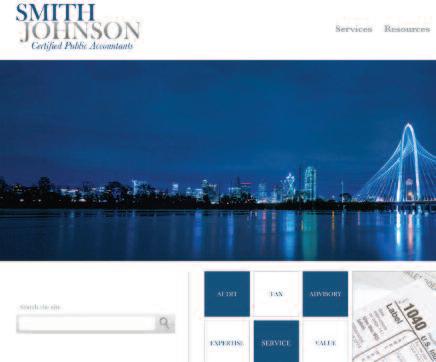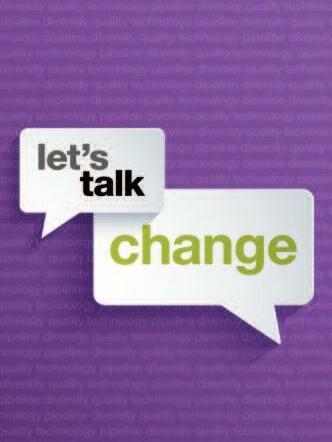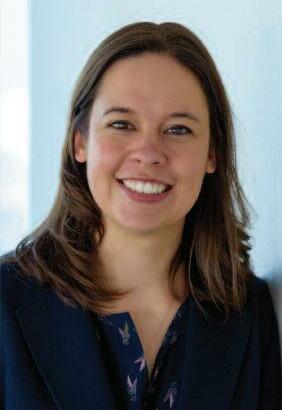Get Ahead. Stay Ahead. Look to the Future.
n Savvy CFOs (And How to Become One)


n Big Business Trends (Hint: Tech Is It!)

n 5 Hot Jobs (The What, Why & How)
n Whistleblowing 101 (For Newbie Tipsters)
n Tax Tripwires for Startups (How You Can Help)
n Creative HR (Equals Workplace Greatness)
n M&A Fever (Are You Ready?)
E x p l o r i n g t h e i s s u e s t h a t s h a p e t o d a y ’ s b u s i n e s s w o r l d g w w w i c p a s o r g / i n s i g h t W I N T E R 2 0 1 6 / 1 7
How can I eliminate unnecessary steps in my tax research process?
Get the Whole Picture with Checkpoint Catalyst



Thomson Reuters Checkpoint Catalyst® delivers trusted tax research answers framed in an entirely new way, so you can see the clarity, color and context you need to get the whole picture of each business tax issue.





Checkpoint Catalyst is a truly integrated research experience that streamlines the tax research process, eliminating extra steps and guiding you from question to answer to action. Federal, state and U.S. international tax implications are part of the main topic discussion, so there’s no need to look anywhere else. Multiple perspectives from leading industry experts and embedded tools and diagrams provide clear answers and the confidence that comes from knowing you haven’t missed a thing.
To learn more or for a FREE trial, visit checkpointcatalyst.com
©2016 Thomson Reuters




















































You’ve earned it. Smith Johnson’s team of talented professionals comes from diverse backgrounds. Many of them joined us after achieving success with the international accounting firms. Our Certified Public Accountants have various specialties and a wide range of business planning expertise, allowing them to help your privately held business become more operationally efficient and competitive. With a focus on helping our clients find the right solutions for their unique needs, we tailor our approach for each client by offering a full spectrum of services from traditional one-on-one consultations and guidance, to innovative, web-based services that provide the We Accept Make Payment of Completely Secure Smith Johnson, CPA 123 Main St. City, State 23451 Phone: (123) 345-4751 Email: payments@sjcpa.com Web: http://www.sjcpa.com Invoice Payment Payment Detail Amount to Pay* Invoice Number Amount to Pay Invoice Number Cardholder Information Name Name MonthYear 2010 35% 2013 47% 2016 55% 2019 75% EST Pay Invoice You work hard for your clients – why not present them with a simple and secure way to pay for your services? CPACharge provides your firm with a convenient, affordable solution for managing credit card and ACH payments, including the option to pass on the cost of processing fees. Getting paid for your work should be easy – you’ve earned it! The payment solution for CPAs. Professionally accept all major cards. CPACharge is a registered ISO/MSP of BMO Harris Bank, N.A., Chicago, IL CPACharge.com | 844.352.4705 1.95% & 20¢ per transaction No swipe required No equipment needed $10 Per Month Open an account by October 28th and receive no monthly fee for 3 months! 3 MONTHS FREE Affinipay FP4C

2 INSIGHT www icpas org/insight i n d e x @IllinoisCPA #INSIGHTmag in this issue:
ahead and staying ahead in 2017 28 Leadership Most Flawed The rise and disasterous fall of five American CEOs 32 Hot Jobs 2017 Careers in accounting and finance are booming this year, with both market demand and salaries on the rise 36 Four Business Trends to Watch This fab or fearful four will rock the finance world in 2017 And guess what, they all hinge on technology. 6 Seen Heard Best Bosses / Bye-Bye Skinny Tie / Governor $$ / Top Harvard Reads / Offshore Crackdown 10 Tech Pulse Data Analytics + Accounting? 14 Leadership You Need a Hobby No time for diversions? Better find some, because it could make you the best boss ever. 18 Ethics Your Guide to Whistleblowing Here’s how to navigate the career minefield that goes hand-in-hand with pointing the finger at misconduct 20 M&A Does Your Firm Have Curb Appeal? Nine signs you ’ re not acquisition ready 22 Entrepreneurs Startup Tax Fails The biggest missteps entrepreneurs take and how you can help them find their footing 24 Retention Avant-garde HR Three innovative ways to boost employee morale, groom your leaders and send productivity through the roof 26 C-Suite You’re the Savviest CFO Ever! Want to know why? We’ll tell you 4 Today’s CPA You Ain’t Seen Nothing Yet Todd Shapiro 12 Hype It Be a CPA! Sarah Herrmann 40 Tax Decoded Illinois Property Tax Made Simple-ish Keith Staats, JD 42 Ethics Engaged The Economics of Ethics Elizabeth Pittelkow, CPA, CITP, CGMA, DTM 44 Corporate Minds Find Your Middle Ground Rose Cammarata, CPA, CGMA 48 Capitol Report New Year, New Springfield? Marty Green, Esq columnists trending topics features W I N T E R 2 0 1 6 / 1 7 | w w w . i c p a s . o r g / i n s i g h t
Getting

today ’sCPA
{Follow Todd on Twitter @Todd ICPAS} {Watch Todd’s CEO Video Series on YouTube}

You Ain’t Seen Nothing Yet
the next 20 years of tech advances will disrupt the profession in a big way.
When you really look at it, technological advances in the accounting profession have been focused most heavily on translating the old way of doing things into seamless, elevated efficiency and productivity. We couldn’t do our jobs without Excel, for instance, but all Excel really does is computerize that old green columnar paper And while the cloud is all the rage, it’s just another way to store and share data What we’ve seen over the last four decades is a technol o g i c a l evolution H o w e v e r, w e ’ r e n o w o n t h e c u s p o f a technological revolution The profession, as we know it, will look dramatically different 20 years from now One global f i n a n c i a l i n s t i t u t i o n , f o r e x a m p l e , s a i d t h a t w h i l e 2 , 0 0 0 employees around the globe are involved in the monthly close process, by the year 2020 that process will be fully automated What’s more, one Big Four firm noted that it will be hiring half as many new staff by the year 2020 as a result of technological advances and artificial intelligence (AI) Maybe this won’t all happen by 2020, but it will happen at some point and it will happen fast.
C o m p l i a n c e - r e l a t e d a u t o m a t i o n w h e t h e r i n p u b l i c accounting (audit and tax) or in corporate accounting will s h a p e t h e p r o f e s s i o n a l l a n d s c a p e m o v i n g f o r w a r d s . I n t egrated systems and new technology within companies will allow for expanded automation. Companies and accounting firms are already using AI and Robotic Process Automation (RPA) One Big Four firm is using Watson, IBM’s AI tool, to read 100 percent of contracts during a client engagement
As Watson “reads” through these contracts, it actually learns and can track transactions directly into the company’s general ledger
Te c h n o l o g y a n d t h e a u d i t p r o c e s s a r e o n a c o l l i s i o n course Today, audits are premised on statistical samples upon which a financial statement opinion is based. The use of RPA and AI will allow for 100-percent testing Yes, an audit in the future may test every transaction. The AICPA’s Auditing Standards Board (ASB) will be developing standards that allow for either statistical sampling or 100-percent testing For years there’s been talk of continuous audit, and many laughed at the thought. That day may be here sooner than you think
So, what does this mean for the accounting and finance p r o f e s s i o n ? C PA s h a v e a l w a y s p o s i t i o n e d t h e m s e l v e s a s t r u s t e d b u s i n e s s a d v i s o r s . I n t h e f u t u r e , i t w i l l b e m o r e important than ever for CPAs to move from a compliance to an advisory role That move will have a dramatic impact on the education and training of future CPAs New hires will n o t l e a r n t h e o l d - f a s h i o n e d w a y o f p e r f o r m i n g l o w - l e v e l compliance tasks They will be expected to be advisors and analysts right from the start
Your Illinois CPA Society is starting to plan for the year 2025 Our Board of Directors and other volunteer leaders will be meeting to look at what CPAs will be doing in eight years time, since 2025 will be here before we know it By starting to plan now, we hope to continue helping CPAs succeed, both today and in the future
4 INSIGHT www icpas org/insight
INSIGHTS & SOCIETY NEWS FROM TODD SHAPIRO, ICPAS PRESIDENT & CEO
INSIGHT MAGAZINE
Publisher/President & CEO Todd Shapiro
Editor-in- Chief Judy Giannetto
Art Direction & Design Judy Giannetto
Production Design Rosa Garcia
Managing Editor Derrick Lilly
Photography Jay Rubinic, Derrick Lilly, Nancy Cammarata Circulation Carl Siska
National Sales & Advertising

Michael W Walker

The RW Walker Company P: 213 896 9210
E : mike@rwwcompany com
Editorial Offices 550 W Jackson Boulevard, Suite 900, Chicago, IL 60661
ICPAS OFFICERS
Chairperson, Scott D Stef fens, CPA Grant Thornton LLP
Vice Chairperson, Lisa A Har tkopf, CPA Ernst & Young LLP
Secretary, Rosaria Cammarata, CPA , CGMA Mattersight Corporation
Treasurer, Margaret M Hunn, CPA , CFE, CFF Rozovics Group LLP
Immediate Past Chairperson, Edward J. Hannon, CPA , JD, LLM Quarles & Brady LLP
ICPAS BOARD OF DIRECTORS
Brent A Baccus, CPA Washington Pittman & McKeever LLC
Christopher F Beaulieu, CPA, MST CliftonLarsonAllen LLP
Terry A Bishop, CPA Sikich LLP
Jon S. Davis, CPA University of Illinois at Urbana
Eileen M Felson, CPA, CFF PricewaterhouseCoopers LLP
Stephen R Ferrara, CPA BDO USA LLP
Jonathan W Hauser, CPA KPMG LLP
Anne M Kohler, MBA, CPA, CGMA The Mpower Group
Thomas B Murtagh, CPA, JD BKD LLP
Elizabeth S Pittelkow, CPA, CITP, CGMA ArrowStream Inc
Maria de J Prado, CPA Prado & Renteria CPAs
Kelly Richmond Pope, Ph D , CPA DePaul University
Andrea K Urban, CPA ThoughtWorks Inc
Kevin V Wydra, CPA Crowe Horwath LLP
INSIGHT is the official magazine of the Illinois CPA Society, 550 W Jackson, Suite 900, Chicago, IL 60661, USA Its purpose is to serve as the primary news and information vehicle for some 24,000 CPA members and professional affiliates Statements or articles of opinion appearing in INSIGHT are not necessarily the views of the Illinois CPA Society The materials and information contained within INSIGHT are offered as information only and not as practice, financial, accounting, legal or other professional advice Readers are strongly encouraged to consult with an appropriate professional advisor before acting on the information contained in this publication It is INSIGHT’s policy not to knowingly accept advertising that discriminates on the basis of race, religion, sex, age or origin The Illinois CPA Society reserves the right to reject paid advertising that does not meet INSIGHT’s qualifications or that may detract from its professional and ethical standards The Illinois CPA Society does not necessarily endorse the non-Society resources, services or products that may appear or be referenced within INSIGHT, and makes no representation or warranties about the products or services they may provide or their accuracy or claims The Illinois CPA Society does not guarantee delivery dates for INSIGHT The Society disclaims all warranties, express or implied, and assumes no responsibility whatsoever for damages incurred as a result of delays in delivering INSIGHT INSIGHT (ISSN-1053-8542) is published four times a year, in Spring, Fall, Fall, Winter, by the Illinois CPA Society, 550 W Jackson, Suite 900, Chicago, IL 60661, USA , 312 993
of the contents may be reproduced by any means without the written consent
Specialist, at the address above Periodicals postage paid at Chicago, IL and at


to:

993 0407,
312 993 7713 Copyright © 2016 No part
INSIGHT Permission
be
to: Publications
additional mailing offices POSTMASTER: Send address changes
0407 or 800
fax:
of
requests may
sent
INSIGHT, Illinois CPA Society, 550 W Jackson, Suite 900, Chicago, IL 60661, USA
www icpas org/insight | FALL 2016 5 LEARN. DEVELOP. LEAD 2017 Conference
March 23, 2017 | Rosemont
Wednesday,
SEEN HEARD
$998.00
HOW TO
BE THE VERY BEST BOSS
What is it that the best bosses have in common that the rest don’t? Corporate HR leader and consultant Duncan Ferguson and his Lead Well LLC partners, Dr Toni Pristo and Dr John Furcon, conducted a Best Boss survey to discern exactly that Here are the five behavioral traits they found repeatedly highlighted by survey respondents:

1 Leads from a higher purpose: That means acting on behalf of the individual versus out of self-interest
2 Activates potential: “Can you help someone see something in themselves that they don’t see?” asks Ferguson The best bosses observe, value and take steps to activate present capabilities and future potential
3. Grants autonomy: Great bosses impart knowledge, business acumen and big picture thinking, and they establish an autonomous space for individuals to perform and make their own decisions
4. Gives continual and per vasive f eedbac k: These leaders also use frequent and diverse feedback to constructively shape, reinforce and/or modify behavior
5 Encourages risk-taking to drive learning: They fuel reasonable risk-taking to ensure learning, while realizing that mistakes are a natural part of the growth process
The End of the Skinny Tie?
Ok all you fashion-focused business execs, Bloomberg reports that it ’ s time for a wardrobe makeover The skinny tie is out!

Why? Because today ’ s fashion houses are moving away from the clipped, hepcat silhouettes popularized in the early 2000s and towards the softened shoulders and more relaxed aesthetic Italian tailoring is famous for Neckties, therefore, are following suit (no pun intended) As Bloomberg writer Troy Patterson wittily puts it, “ With suit lapels no longer resembling boning knives, it is only natural that neckties should move further away from the Reservoir Dogs collection ”
WHAT’S A GOVERNOR WORTH?
Ever wonder why more individuals aren’t pursuing public office? Perhaps it ’ s because it doesn’t pay at least not compared to the $16.3M in total compensation averaged by the CEOs of our nation’s largest companies. Public payroll data from all 50 states indicates that the average U S governor earns $137,415 a year Illinois Gov Bruce Rauner, who forgoes his state salary, would earn nearly $178k, or 129 percent of the national average, ranking him fifth among the 50 state governors Chicago Business Journal reports that pay grades appear to have little correlation to the scope of a governor ' s financial responsibilities
6 INSIGHT www icpas org/insight
N E W S B Y T E S , S O U N D A D V I C E A N D P R A C T I C A L B U S I N E S S T I P S
“Accept that some days you are the pigeon, and some days you are the statue.” Dilbert
Average holiday shoppers expect to spend on gif ts and holiday-rel ated activities [deloit te]
loose sleep ovver... .




20 TOP
IRS’ Offshore Crackdown Pays Off
The IRS’ Offshore Voluntary Disclosure Program intended to prod taxpayers into disclosing their offshore bank accounts and pay taxes on their holdings is seeing results in a big way The latest figures indicate 55,800 taxpayers have entered the Program to resolve their tax obligations, paying more than $9.9B in taxes, interest and penalties since 2009. On top of that, an additional 48,000 taxpayers have used separate streamlined procedures to correct their previous omissions and meet their federal tax obligations, paying approximately $450M in taxes, interest and penalties That ’ s good news for U S coffers
88%
consumers expecting the u s economy to improve or remain the same in 2017. [deloitte]
5 Required Reads for Harvard Business Students

An MBA from Harvard will cost you upwards of $150K , but that doesn’t mean you can’t learn a thing or two on the cheap Just pick up some of the books that Harvard MBA students are required to read
1 True North: Discover Your A uthentic Leadership Former Medtronic CEO Bill George collects the wisdom of 125 of the best leadership minds to discover five steps to authentic leadership
2 The Money of Invention: How Venture Capital Creates New Wealth Paul A Gompers and Josh Lerner write about the struggles of securing financing, and how venture capital can help business people overcome those challenges
3. Many Unhappy Returns: One Man's Quest to Turn Around the Most Unpopular Organization in America. Here, former IRS commissioner Charles O. Rossotti chronicles his efforts to turn around the public’s perceptions of the agency, as well as its performance.
4 Unleashing Innovation: How Whirlpool Transformed an Industry Whirlpool VP Nancy Tennant Snyder details how the company improved margins, expanded internationally and became more innovative
5 Scaling Up Excellence: Getting to More Without Settling for Less Stanford’s Robert Sutton and Huggy Rao distill 10 years of research and case studies into how organizations can scale successfully
Smartphone vs. Pen & Paper
The average person checks his or her phone 50 to 150 times daily Greg McKeown, author of Essentialism: The Disciplined Pursuit of Less, says you’d be far more productive writing in a notebook instead Here’s why You ’ll be proactive. Writing “gives you the chance to craft your reply instead of shooting it off reactively, and respond on your schedule, not someone else’s,” says McKeown
You’ll be more grounded. Obsessing over your phone creates a “ compulsive feeling that you might be missing out,” McKeown contends, but writing in your notebook has a calming effect
You’ll be ‘in the moment.’ Constantly checking your phone distracts you from what ’ s right in front of you, while writing in your notebook gives you pause to think of what's important in the here and now
You’ll have more time. Smartphones can be time-wasting distractions. Writing, on the other hand, provides you with time to think and reflect
8 INSIGHT www icpas org/insight SEEN HEARD
“The key to being a good manager is keeping the people who hate you away from those who are still undecided.” Casey Stengel
The days of sitting mindlessly in front of the instructor for eight hours are gone.






















































Maximize the return on your training investment as you put your brain in its happy place with new, engaged learning activities at ICPAS education programs:
Game Shows Group Discussions


Role Playing Case Studies
Online Polling Simulations
































































































































































































































































Start enjoying your learning experience with ICPAS Engage courses, conferences, OnDemand and Newscast programs.
For more information on ICPAS Engage offerings, visit www.icpas.org

video See what makes our courses so much fun.
Less than 0.5% amount of data that is analysed and used [technology
Data Analytics + Accounting?
Big data is in big demand, which means more opportunities for CPAs and accounting graduates with an eye for analytics. But how do you get into it?
In response to the need for individuals who can analyze large sets of data to drive decision-making, Illinois universities and colleges are aiming to enhance their accounting programs with more data. Notably, the University of Illinois is currently piloting a new
Accountancy Director of Administration at the University of Illinois at Urbana-Champaign, says the concentration is designed to develop leaders who understand how to apply data analytics in a variety of accounting and business contexts, and critically s
o b l e m s u s i n g d a t a - i n t e n s i v e b u s i n e s s a n d accounting information.
Northern Illinois University (NIU) also is developing a Big Data/Data Analytics concentration track for its accounting students, and it could launch as soon as the next fall term. Kelsey Johnson, MAS Leadership Advisor at NIU, notes that data analytics will continue to grow in importance, especially since accounting firm KPMG is partnering with universities around the state to help them put together accounting programs with greater data focus.
While it’s a slow process for academic institutions to develop, approve and roll out official programs, current accounting students may soon have the option of choosing Big Data as their Master ’s degree concentration.

But what if you’re already out of school? Accounting grads and working professionals can still gain recognition in a data analytics field through various dual degree and online Master ’s and professional certificates programs The University of Chicago, for example, offers an online Business Analytics certificate, where participants learn how to process and visualize data, and how to solve real-life business problems through data analysis. For those seeking a second degree or Master ’s in Data Science, Elmhurst College offers an online-only, part-time, two-year program Elmhurst also offers a Certificate in Data Science for students who aren’t interested in completing a full Master ’s program
Visit www mastersindatascience org/schools/Illinois for more information on programs throughout the state And read more about technology developments over the next year in Five Business Trends to Watch on page 36
10 INSIGHT www icpas org/insight
T H E L AT E S T, G R E AT E S T T E C H N O LO G Y T R E N D S & P R O D U C T S
TECH PULSE
review]
a t a A n a l y t i c s i n A c c o u n t a n c y C o n c e n t r a t i o n w i t h M a s t e r o f
c c o u n t i n g S c i e n c e s t u d e n t s . S u s a n T h o m a s
D e p a r t m e n t o f
o l v e b u s i n e s s p r
D
A
,
Every year, we have more qualified applicants than awards to give. Your gift, no matter the size, will help us to close the gap and ensure that an education is possible for hundreds of future CPAs.

Donate today.
CPA Endowment
of
CPA Society’s charitable
Make success possible.
www.icpas.org/annualfund The
Fund
Illinois, the Illinois
partner, is making great strides in providing life-changing opportunities to deserving accounting students through its scholarship and training programs. In 2016, we provided over $185,000 in support to more than 130 students across the state.
CPA Endowment Fund of Illinois
Tomorrow’s CPAs meaningful supportive inspirational
Paving the Way for
HYPE IT
Be a CPA!
A s s o m e o n e w h o w o r k s c l o s e l y w i t h o u r student and young professional members, I ’ m a l w a y s k e e p i n g a p u l s e o n t h e C PA E x a m . T h a t ’s w h y, w h e n I h e a r d t h a t t h e percentage of students pursuing their CPA a f t e r g r a d u a t i o n w a s d e c r e a s i n g , i t w a s a major concern
Additionally, the April 2017 changes to the CPA Exam have caused a lot of anxiety t h r o u g h o u t c o l l e g e c a m p u s e s A n d s o , t o h e l p a d d r e s s t h i s i s s u e , t h e I l l i n o i s C PA Society launched a “Be a CPA” integrated marketing campaign last spring The aim of this campaign is to help raise awareness of all the great things associated with having the CPA credential
O f c o u r s e , I e n l i s t e d t h e h e l p o f t h e Young Leaders Advisory Council (YLAC) to ensure we got it right YLAC provided valuable insights into what the credential means to them. Several members also participated in a video to promote the credential, which has been a hit on college campuses.
T h e s e a r e t h e f i v e m a i n r e a s o n s w e believe sitting for the CPA Exam is essential.
1 Better Opportunities
The CPA credential gives you a competitive e d g e i n t h e m a r k e t p l a c e , a n d c o n v e y s t o employers that you have the commitment and stamina to succeed in the profession and to make a very real contribution to their organizations
Sarah Herrmann Hype It Editor ICPAS Member Outreach

2. Prestige & Credibility
That same commitment and stamina reflects on you as an individual both professionally and personally.
3. Diverse Careers
The CPA credential opens doors Whether your goal is to work for one of the Big Four, venture into the world of corporate finance, or join the ranks of a dynamic startup, the CPA earmarks you as the one for the job
4. Social Impact
C PA s h a v e b e c o m e w i d e l y k n o w n a n d r e s p e c t e d a s w a t c h d o g s o f t h e c o m m o n good. When it comes to ethical standards and fighting against fraud, CPAs are on the frontlines
5. More Money
Needless to say, the CPA credential earns a premium, and gives you a notable edge in salary negotiations
Our goal is to debunk myths about the Exam, demonstrate a compelling reason to pursue the credential, and provide resources and encouragement to complete the Exam. What does the CPA credential mean to you? Why did you sit for the CPA Exam and why should a student sit for it now? I chall e n g e o u r m e m b e r s t o t h i n k a b o u t t h e s e questions and become ambassadors for this important and prestigious credential
n
n Discounts on CPA Exam review courses
n A discount on the required Ethics Exam
n Overview and facts brochure detailing the process for applying and sitting for the CPA Exam in Illinois
n Updates on changes to the Exam, launching 4 1 17
12 INSIGHT www icpas org/insight
M U S T- R E A D N E W S F O R U P- A N D - C O M I N G A C C O U N T I N G P R O S {}
us at www icpas org/BeACPA htm for more information about the CPA Exam and
CPA Society resources, including:
Visit
Illinois
The CPA Exam Award, which covers the NASBA fee
F I N D O U T M O R E
If your clients require expert services, our Client Back Guarantee ensures our consultants are playing for your team. Contact our experts at 866-717-1607. James Schultz Jim Martin Harry Cendrowski CPA/CVA CFF MAFF CMA CIA CFE CPA/ABV CGMA CFF CFE CVA CFD MAFF Working with consultants? Make sure your clients stay with Your Firm. The Business of LINKING OPERATIONAL INTEGRITY For more than 30 years CHICAGO / BLOOMFIELD HILLS / 866-717-1607 / www.cca-advisors.com
You Need a Hobby
No time for diversions? Better find some, because it could make you the best boss ever
By Derrick Lilly
Ac tor Liam Neeson puts on his waders and goes fly fishing whenever he needs to escape the rigors of Hollywood To keep his mind sharp, “ T h e O r a c l e o f O m a h a ” Wa r r e n Buffet plays bridge with Bill Gates. Serial entrepreneur and billionaire R i c h a r d B r a n s o n g r a b s h o l d o f a m i n i p a r a c h u t e a n d s u r f b o a r d t o c a t c h s o m e a i r k i t e s u r f i n g a c r o s s ocean waves Channeling her comp e t i t i v e n e s s , F o r m e r S e c r e t a r y o f S t a t e C o n d o l e e z z a R i c e h i t s t h e l i n k s a s o n e o f t h e f i r s t w o m e n t o earn a membership at the coveted Augusta National Golf Club
That’s right, even the busiest and most influential people we know today make time for hobbies not because they’re bored or have nothing better to do, but because it makes good business sense
Now I’m sure you’re thinking this must be some kind of joke Fly fishing? Bridge? Kitesurfing? What can they possibly do for your career?
“Quite simply, hobbies provide balance,” explains Duncan Ferguson, managing director of Client Services at Vantage Leadership Consulting, and a seasoned corporate HR leader. “Too many people let the demands of their jobs take over their lives; they get so invested in their work that they can’t separate themselves from it ”
This is all too common in the accounting and finance world. The problem, however, is twofold. “For one, it’s not good for your health Two, it makes you very one-dimensional you lose perspective of not only yourself but of the people around you, too,” says Ferguson “Finding balance in how you approach life is not only the right thing to do for yourself; it’s the right thing to do for your team and organization Being balanced allows you to be a better boss a better leader because you’re more in tune with yourself and with the people surrounding you.”
So, if you’re ready to be the best boss you can be and take your career to the next level, let’s talk about four hobbies that could help
Maestro of Music
Music as an art form brings together people from all walks of life, giving them something to collaborate on and bond over Learning to play music, however, takes things a step further it can be an effective lesson in harmonious team building and leadership
“I knew a leader who really liked music, so he went to Chicago’s Old Town School of Folk Music to learn how to play an instrument There, he was placed in a band with other people of similar talent and then taught how to perform What he got out of that,” Ferguson explains, “is that it was about working as a team. It was about learning how to offer constructive feedback and instill collaboration It was about everyone playing their part to reach a common goal ”

14 INSIGHT www icpas org/insight LEADERSHIP
take your learning to new
Your learning adventure awaits you. With the Access Pass, you’re free to explore 40 hours of CPE for only $199 ($249 for non-members).


Extensive library of 100+ hot topics
Solutions from leading experts Interactive, engaging, and fun
Start your journey today at
good through 9.30.17
www.icpas.org Subscription
This same leader ultimately decided to try the exercise with his team at work, Ferguson recounts After all, leadership is about leading people If he could lead them as a band, he could lead them as a productive team.
Essentially, each person plays a specific role within your team, as they do within a band or orchestra Without seamless collaboration, an ear for the role of fellow team members, and perfectly timed coordination, the band and the team fall apart
Forerunner of the Fairway
If peace and solace are more of what you’re after, picking up golf may be a better choice Cliché? Perhaps But golf is a challenging sport that’s certain to put your will and determination to the test regardless of whether you want to play it well or just use it as a way to close business deals
“The funny thing about golf is that your 300-yard drive down the middle of the fairway doesn’t mean anything if you’re prone to shanking your nine-iron every time there’s a sand trap ahead Golf teaches you to think one step one shot ahead You’re going to learn to plan and strategize. You’re going to learn how to manage your emotions and stress,” says Ferguson
And let’s not forget integrity A bad lie? A lost ball? Will you become the Master of the Mulligan, or will you swallow your pride and forge on to overcome the hurdle ahead regardless of your score?
As for golf only being for the guys, think again. Funded in part by proceeds from the KPMG Women’s PGA Championship, the KPMG Future Leaders Program aims to advance emerging women in business through scholarships, leadership development retreats, mentoring relationships with women business leaders, and, of course, an introduction to golf
KPMG says it is passionate about developing women leaders through golf, and that the KPMG Future Leaders Program helps to instill the confidence and leadership skills women need to succeed and lead in college and their careers By the way, Condoleezza Rice is an ambassador of the program.
Master of Mechanics
If you don’t like getting your hands dirty, auto mechanics probably isn’t for you and maybe leadership isn’t either
Like any well-run machine, your business and your team need tuning and maintenance to keep things humming along Being an effective leader requires knowing the ins and outs of your people, products and services, and sometimes that means getting down on the factory floor, or out in the field, to see how everything is made, what challenges face your business, and how to think critically and analytically to make the decisions that will keep things moving at full power sort of like what a skilled mechanic has to do
“Business, like mechanics, is about diagnosing a problem and identifying a course of action A good leader, like a good mechanic, understands the need to focus on the problem at hand,” says Ferguson “He or she sees the connection between the big picture and the small and precise steps it takes to achieve the goal ”
“This type of hobby hones problem-solving skills and is also a g

t h a t h a s m e a s u r a b l e a n d observable results,” adds executive coach Jay Scherer of Scherer Executive Advisors
What’s more, a hobby like auto mechanics provides a great sense of accomplishment when the project is completed, says Scherer plus hiding out in the garage can be a great escape.
Trailblazer by Bike
Looking for another great escape, or maybe an adrenaline rush? Whether you’re into hurling yourself down black diamond downhill trails or racing across two-lane country roads, there’s more to cycling and mountain biking than just the thrill of it all there’s also a lot about leadership that can be learned on two wheels
“Cycling is one of those hobbies that’s very positive because it provides an escape to recharge while also building much-needed business skills,” says Scherer “It definitely builds your stamina and physical fitness, but it also can fine tune your mental toughness, tenacity and ability to take calculated risks outside of your comfort zone ”
Stare at the front wheel and you’re bound to crash. Pick the wrong size bike, built for a different type of terrain, and you’re bound to be uncomfortable, inefficient and downright lagging if not immobile. Lack confidence and an adventurous spirit and you’ll never keep up with the pack, let alone forge your own path.
Being a great cyclist means being efficient with both mind and body, looking ahead when navigating complex routes, being flexible and nimble to overcome unexpected obstacles, being analytical in piecing together a machine that excels under your body in your preferred terrain, being dedicated to skills training and development, and valuing communication and teamwork if competitive racing is your thing
Whichever way you look at it, hobbies are well worth your time They help you reduce stress, learn new skills, focus and build confidence and they may even provide an informal outlet for connecting with your peers. Simply, hobbies help you to become the best boss you can be
16 INSIGHT www icpas org/insight
o o d p r a c t i c e i n c r e a t i n g a p r o c e s s

Learn more about the Illinois CPA Society Ethics Committee at www icpas org
Your Guide to Whistleblowing

Here’s how to navigate the career minefield that goes hand-in-hand with pointing the finger at misconduct
By Bridget McCrea
In September of last year, a financial executive collected a near-record $22M whistleblower award from the Securities and Exchange Commission (SEC). This award recognizes professionals who report improprieties on behalf of their employers or clients. In this particular instance, a Monsanto employee “blew the whistle” by providing information about the firm’s insufficient internal accounting controls
According to the Maryland Association of CPAs, the company was booking full revenue from the sale of one of its flagship products without reducing that revenue for the expected impact of rebates offered on those sales. The SEC ruled that Monsanto’s own CPAs knew or should have known that the sales force was using the rebate program to incentivize sales in 2009, but improperly delayed the recording of those costs until the following year
“Financial reporting and disclosure cases continue to be a high priority for the Commission, and these charges show that corporations must be truthful in their earnings releases to investors and have sufficient internal accounting controls in place to prevent misleading statements,” writes MACPA’s Edith Orenstein in Focus on Financial Reporting Fraud. Jane Norberg of the SEC said, “Without this whistleblower ’s courage, information and assistance, it would have been extremely difficult for law enforcement to discover this securities fraud on its own ”
With that September ruling and subsequent payout, the SEC brought the total amount of whistleblower payments to over $100M
What is whistleblowing?
To professionals who may not have experience with the concept of whistleblowing, the Government Accountability Project (GAP) defines it as: “An employee who discloses information that she/he reasonably believes is evidence of illegality, gross waste or fraud, mismanagement, abuse of power, general wrongdoing, or a substantial and specific danger to public health and safety. When information is classified or otherwise restricted by Congress or Executive Order, disclosures only are protected as whistleblowing if made through designated, secure channels.”
According to Accounting Today, The Tax Relief and Health Care Act of 2006 required the IRS to set up a Whistleblower Office by December 2006, and then pay rewards to tax whistleblowers. Prior to this legislation now Section 7623 of the Tax Code the IRS had the option to pay rewards to individuals it previously referred to as “informants.”
Ask the right questions
A somewhat confusing process for professionals to navigate, whistleblowing is fundamentally very clear cut, says George Heyman, an instructor with AuditSense and former chair of the Illinois CPA Society’s Ethics Committee
“When looking for a job, young professionals in particular should do their homework on the company and try to determine what the tone of the company is from the top down about being ethical,”
18 INSIGHT www icpas org/insight ETHICS
says Heyman “That way he or she can minimize the risk associated with the specific situation. As a young professional your goal should be to work for a company that has a solid, ethical approach from the top down, and that will never put you in the position of having to dig your heels in and say, ‘Hey, I cannot do this ’”
Of course, even the best-laid career plans can backfire when things are out of your control and/or area of oversight An employer or client that uses language like, “Hey, we want to stay in business so this is what we need to do,” should send up an immediate red flag. Heyman suggests framing questions such as, “Is this something that we’re allowed to do and that we really should be doing?”
“The Voltaire quote that says, ‘Judge the person by the questions that they ask,’ definitely comes into play when you talk about whistleblowing,” Heyman adds. “Young professionals should pay attention to the questions that their employers ask, and they should also kick things off by asking the right questions right from the start That way, they won’t wind up getting themselves into trouble ”
Five tips to guide you
For pros looking for good advice on how to identify potential problem areas and manage the responsibility associated with whistleblowing, consider these five guidelines:
1. Use integrity as your baseline: Defined as the quality of being honest and having strong moral principles and moral uprightness, integrity plays a key role in all stages of the whistleblowing process from the initial identification of a problem, through to the reporting of that problem, and then follow-up with the appropriate governing body “To have integrity means that you're working for a company that can accommodate the inadvertent error and honest difference of opinion,” says Heyman, “but that will not accommodate deceit or subordination of principle ”
2. Always be skeptical: Don’t take anything at face value, says Heyman, and don’t be afraid to ask the tough questions “Encourage discussions with differing opinions, question the status quo, and notice surroundings and behaviors,” he advises, adding that you should be asking questions like, “Can we really accept this or that as the truth?” and “Are we sure we have everything?” With the latter question, he says the goal is to obtain all the data you need to be able to make educated, confident decisions regarding gray areas around your client’s or employer ’s accounting practices “This is where a lot of people get into trouble,” he says, “and where they wind up saying, ‘Oh, if only I had known ’”
3 Be ready to provide specific examples: As a CPA, the public relies on you to act with competence, objectivity and integrity It also expects you to act with the highest possible level of professionalism and ethical judgment, which means being able to make tough decisions when called upon to do so When submitting a tip to the SEC, be ready to provide specific, timely and credible information. “A general claim that you think your next-door neighbor is committing securities fraud does not give our investigators much to go on even if you are right,” the SEC states. “Our staff will be much better able to pursue an investigation of your tip if they have specific examples, details, or transactions to examine So, the more information and specifics that you can provide to us to follow up on, the better.”
4 Keep it on the down-low: Avoid actions that could reveal your intentions or status as a whistleblower such as conspicuously downloading documents or telling co-workers, even trusted ones, about your suspicions, advises Jordan Thomas in 5 Tips for Potential Corporate Whistleblowers Be particularly careful with electronic communications don’t Google “whistleblower award” or “whistleblower attorney” from your work computer or mobile device, Thomas advises “Also, you don’t have to be Sherlock Holmes, interrogating suspected wrongdoers and taking photos of everything in the office. Let the SEC do its job once it gets the tip from you ”
5. If you aren’t sure what to do, contact the Illinois CPA Society: The ICPAS Ethics Committee can help you determine whether you have a legitimate issue on your hands and/or whether further action is warranted Plus, any contact you have with the committee is completely confidential. “Here at the Ethics Committee, we can’t repeat anything that we hear,” says Heyman, “but we can give good advice on whether the person or organization in question is actually doing something wrong.”
Dive deep into the topics impacting business, accounting & finance today.
YOUNG

www icpas org/insight | WINTER 2016/17 19
BUSINESS GROWTH
JOB HUNTING
CAREER CLIMBING
PRACTICE MANAGEMENT
HIRING & RETENTION
PROFESSIONALS
Check out Copy Desk’s exclusive monthly features today! www.icpas.org/copydesk t
AND MORE
Does Your Firm Have Curb Appeal?
Nine signs you ’ re not acquisition ready.
By Carolyn Kmet
It used to be that a retiring partner from a small to midized CPA firm would groom a successor to take over This straightforward approach ensured a smooth transition from one partner to another specifically, someone already familiar with the firm’s staff, clients and processes.
Today, however, there’s a growing trend towards seeking out mergers and acquisitions instead. In fact, the 2016 Accounting Firm Operations and Technology Survey found that 51 percent of respondents are considering a merger or acquisition in 2017, a 13-percent jump over 2015.
“We’ve seen an increase in accounting firm M&A activity for at least the last five years; over that period, it has been robust and consistent,” says Russell Shapiro, a member of Chicago-based legal firm Levenfeld Pearlstein, LLC, which provides legal representation to many accounting firms in the process of selling, buying or merging
What gives?
“While the trend originally started because of succession planning issues, an estimated one-in-three firms today is pursuing mergers and acquisitions as a way to achieve strategic growth opportunities for their practice and their clients,” explains Allan D Koltin, CPA, CGMA and CEO of Chicago-based Koltin Consulting Group, Inc , specialists in professional and financial services firm mergers and acquisitions
“
t h e b i g g e s t r e a s o n t h e m e rg e r m a n i a h a s c o n t i n u e d i s because the vast majority of mergers that have taken place in our profession have proven to be successful,” he adds, noting that if that wasn’t the case, we would see a “rapid downward spiral” in terms of the number of mergers taking place.
But would you recognize the signs if your firm wasn’t, in fact, M&A ready? These nine factors will tell you everything you need to know.

1. Technology isn’t king
Technology is unquestionably driving M&A activity in the accounting industry. As more and more CPA firms look to capitalize on cloud computing and paperless workflow systems and more mergers and acquisitions offer an efficient way to acquire tech savvy talent.
“The most successful transactions are with firms helmed by visionary leaders who understand the increasing convergence of technology and accounting, and recognize the long-term benefits in scale, value-added service offerings and geographic expansion to meet client needs,” says Jim Sikich, CEO and managing partner of Sikich LLP, a professional services firm.
2. No leaders? No way
Sikich has taken a strategic and aggressive approach to acquiring successful firms with forwardthinking leaders to support his organization’s ambitious national growth goals Not all the firms he encounters, however, are well-positioned for acquisition.
“Some firms come to us to discuss a potential acquisition, and it’s obvious they did little to lay the necessary groundwork. Instead, the leaders waited until they were ready to sell and retire to begin the process,” Sikich explains “An accounting firm is not well-positioned to be acquired if it has aging staff, most of its partners are nearing retirement, and it has failed to address succession.”
20 INSIGHT www icpas org/insight M&A
I b e l i e v e
3. You’re a cultural mismatch
Company culture is another important acquisition consideration

“Many times, companies will have a culture that emphasizes maxi m i z i n g s h o r t - t e r m p r o f i t s a t t h e e x p e n s e o f c r e a t i n g l o n g - t e r m value and sustainability As a result, there is little investment in personnel, which hinders recruitment, development and retention,” says Sikich And that means you’re at a disadvantage as an acquisition target
4. Underwhelming performance
CPA firms seeking a merger or acquisition must demonstrate strong financial performance and positive historical growth, and must have a game plan for profitable future growth “If a firm has poor financial performance and unrealistic expectations relative to its value, it will not be appealing to a potential buyer,” Sikich emphasizes

5. Top talent? Maybe not
A strong staff that provides continuity for clients following a merger or acquisition, and a cohesive partner group, also can contribute to a successful merger or acquisition
“For larger firms, buying a firm that has excellent staff is almost always an absolute must High-quality people are often more difficult to attract and develop than great clients,” says Brannon Poe, CPA, founder of Poe Group Advisors, a brokerage firm that assists with the purchase and sale of accounting practices


6. No objectivity, no buyer
A good rule of thumb is to evaluate both your M&A attractiveness and readiness every couple of years. Regardless of whether firm partners ultimately decide to proceed with an M&A strategy, the evaluation process itself is an important exercise.
“The firm needs to look at the opportunity as objectively as possible from a prospective buyer ’s point of view,” says Poe, further suggesting that firms conduct a SWOT analysis to document their strengths, weaknesses, opportunities and threats He adds an additional factor timing into the mix. Firms will need adequate time t o i m p l e m e n t c h a n g e s a n d i m p r o v e m e n t s t h a t a r i s e o u t o f t h e SWOT analysis, such as changes in billing or pricing, or the need to prune underperforming clients, service lines or staff
7. Cash isn’t flowing
Let’s not forget that cash flow is a top priority Firms trying to position themselves for acquisition and attract buyers might maximize c a s h f l o w b y d r o p p i n g u n d e r p e r f o r m i n g s e r v i c e l i n e s , r a i s i n g prices, or letting go of unnecessary staff positions all of which a SWOT analysis could reveal.
8. You’re on the fence
In Poe’s experience, if the buyer senses that the seller isn’t really ready to sell, then they might stall negotiations or just walk away “No one wants to invest the time and energy required to do a deal, only to have the seller take the practice off the market due to a change of heart,” he explains
9. Niche? What niche?
Developing clientele within a specific niche or specialty practice also may help firms increase their attractiveness “From the buyer ’s perspective, acquisitions are made to expand and strengthen geographic reach, add or enhance certain expertise, and to leverage infrastructure,” Shapiro explains
While it takes significant time and investment to properly position a firm for acquisition, it’s all in the name of increasing that “curb appeal ”
www icpas org/insight | WINTER 2016/17 21
HOME Discover what ICPAS’ Center for Corporate Financial Leadership has to offer YOU! www.icpas.org/ccfl
Startup Tax Fails

The biggest missteps entrepreneurs take and how you can help them find their footing
By Robert J. Derocher
For CPAs working with startups and budding entrepreneurs, the calls often come to them in late March or early April “Do I have to pay sales tax?” “We haven’t filed a return in six years We lost money Why do we need to file a return?” “Do I have to keep financial records?” “Really? That’s not what Google says ”
They’re all true tales from the startup frontlines, where many CPAs have discovered that some of today’s newest businessmen and women often breeze right past Finance 101 on their way to fame and fortune.
“They have a big passion for what they’re doing, but they don’t really care about accounting,” says Curt Mastio, CPA, of Founder ’s CPA Group in Chicago, founder of Startup Accounting Advisors and an adjunct instructor at Northwestern University's Farley Center for Entrepreneurship and Innovation. “They often struggle to adapt to the tax and legal requirements.”
And therein lies the opportunity for CPAs to help many of those fledgling entrepreneurs find their financial footing.
Where do startups trip up? How can CPAs provide the professional guidance needed to help them? Below we share insights and observations from CPAs who have spent time with startups of all stripes and who have launched and managed their very own startup organizations.
The ground floor
The first pitfall? Failing to build a “financial foundation at the beginning” and “implement an accounting process at the start,” says Joshua Lance, CPA, CGMA, founder and managing director of Joshua Lance CPA, LLC in Chicago and adjunct instructor at Northwestern University’s Farley Center for Entrepreneurship and Innovation. Too many startups, he says, ignore doing this.
For many eager startups, Lance explains, it’s a combination of factors that keep them from seeking that initial financial advice, including excitement over their product or service, a narrow focus on delivering that product, and an overall blissful ignorance of reporting and recordkeeping necessities.
“There are owners who think they know everything and won’t listen to our advice,” says Lance. “Those startups are often not successful.”
Too often, entrepreneurs are “making a decision from the gut, without having a financial background,” adds Kimberly Loftis, principal of Loftis Consulting and Financial Management in Chicago. “By the time they get to me, things are already a mess.”
A longtime CPA who’s been working with small and midsized companies for the last six years, Loftis also has seen the pendulum swing in the other direction startups that get lost in the unfamiliar weeds of finance end up losing track of their initial business.
22 INSIGHT www icpas org/insight ENTREPRENEURS
Her advice? Go slowly in advising startup clients “You have to start with something that people understand Start with a little nugget of information that will help them,” she says “If we go in too finance heavy, they might run away.”
It’s age-old business advice, Mastio adds, but it still applies for startups today: “It always costs more to fix mistakes than it does to pay upfront for help.”
The financial house
Burn rates, financial statements, sales tax filings, tax write-offs it’s all well-known to CPAs who work with businesses, but not so much to those startups going it alone Properly keeping the books and then staying on top of them remains an Achilles heel for many startups
A CPA’s advice can be critical for those entrepreneurs who haven’t yet grasped the importance of keeping proper financial records for everything from lunch receipts to complex investing, says Rob Pasquesi, CPA, MBA, who launched his Chicago tax and accounting firm, Pasquesi Partners LLC, in 2014 “Startups have a hard time understanding what is revenue and what is cash flow, how to manage payroll and expenses,” he explains
“They don’t have separate bank accounts, they don’t deduct business expenses, they don’t know how to pay themselves,” adds Mastio “There’s a concern about being overwhelmed about everything that needs to be done from a tax perspective.”
But a CPA doesn’t necessarily need to be there every step of the way, Loftis and others say Xero, FreshBooks and QuickBooks are just a few of the many software accounting and bookkeeping tools startups can use to get a handle on their financial requirements
“We had a young company with a great product going out for venture funding. Venture capitalists want to see financial statements on a regular basis,” Pasquesi explains “If you’re on an accounting software platform, it’s no problem. Instead, they had to scramble and put in hours and hours of work ”
“Help them with the software. Then, as the business grows, work with them on financial modeling and other things they’ll need,” Loftis advises
The professional team
One of Mastio’s earliest forays into advising startups involved helping a college student’s bootstrapped company. This young entrepreneur decided not to hire a bookkeeper and had virtually no accounting background, which caused the company to miss multiple opportunities to save money through tax deductions and avoiding penalties.
“No two startups are really the same You really need to find a specialized CPA who understands your business,” Mastio advises.
Having a CPA with a background in financial reporting, for example, is an asset for startups on the lookout for venture capital and angel funding an activity that has increased significantly in the Chicago region, says Pasquesi
While providing the necessary financial expertise, a CPA who works regularly with startups also can introduce much needed, and similarly experienced, attorneys, insurance agents, finance brokers and other professionals. Establishing a proper legal company structure (LLC, C Corporation, S Corporation, etc ), for example, is a key early task that usually requires an attorney.
“They’ll do their Google searches and register in Delaware because that’s what they hear everyone else is doing,” says Pasquesi “It’s bad advice ”
In Lance’s opinion, however, the startup adventure really needs to begin with the CPA “Of all your advisors, it’s the CPA who actually knows all of the nitty-gritty,” he says “The CPA sees the whole playing field ”
If you’re a CPA wanting to find your niche in the startup arena, it’s important to understand the nature of the startup entrepreneur, which means finding out where they gather, what they talk about and what they want from their fledgling startups especially with so many young, tech-savvy entrepreneurs on the landscape
“Go to their conferences Go to their software meet-ups,” Lance advises “You have to be tech-forward. Startups are going to expect you to speak their language. Embrace the things that startups are using ”
And then embrace the business opportunities they offer.
Don’t miss this great opportunity for you to interact with the Society's leadership and your peers as you discuss the powerful issues facing the profession.

www icpas org/insight | WINTER 2016/17 23 REGISTRATION Call 800.993.0407 or visit www.icpas.org.
an
on
unprecedented era of
that our
is
and
to you.
Please join Scott D. Steffens, CPA, Chair of the ICPAS Board of Directors and Todd Shapiro, ICPAS President & CEO,
for
engaging conversation
the
change
profession
entering
discuss what it will mean
Glenview January 18, 2017 Chicago January 19, 2017 CPE: 1.5 Credit Hours Cost: FREE Complimentary breakfast included. ICPAS | town hall forums
Av a n t - g a r d e H R
Three innovative ways to boost employee morale, groom your leaders and send productivity through the roof
By Selena Chavis
As the concept of work-life balance is increasingly mainstreamed into the American psyche, the business community is responding in kind think shorter workdays and work weeks, and paid time off to travel the world The ROI these innovative approaches are seeing might just have you thinking outside the box as well
Month-long sabbaticals
Sarah Shepard, a partner in Plante Moran’s Chicago office, took her first paid, month-long sabbatical in early 2016 She kicked it off with a trip to New Zealand, where she spent 10 days exploring North Island with her husband Then came Florida’s Walt Disney World with her 10-year-old niece Next up, some R&R on West Palm Beach To wind it all down, a girls’ trip to Scottsdale, Ariz It might sound like Shepard has it made, but sabbaticals and many other forward-thinking HR tactics increasingly are being used to recruit, retain and motivate today’s top talent
“One of the more obvious benefits of the sabbatical program is that it prevents partners from becoming burned out, but it really goes further than that––it’s an important step to succession planning,” Shepard contends “When we take a sabbatical we have to relinquish control; we have to transition our work and prepare the right people to take over in our absence. It teaches partners to train and develop staff, and gives staff an opportunity to step up and manage a client relationship.”
Plante Moran began its program in 2001, offering partners a paid sabbatical of 30 consecutive d a y s e v e r y f i v e y e a r s , e x p l a i n s C h i c a g o o f f i c e Managing Partner Tom Kinder. “The time is to be u s e d f o r r e s t , r e l a x a t i o n a n d r e n e w a l . C o n t a c t with the firm and clients during this time is highly discouraged,” he says.
If you think Plante Moran is an anomaly, then let me tell you that Deloitte and Goldman Sachs also see the merits of sabbaticals Could your firm or company be next?
Five-hour workdays
Stephan Aarstol, CEO of Tower Paddle Boards, believes that a lot of time is wasted in today’s offices. Aiming to shed dead weight and foster an entrepreneurial work ethic, he devised a five-hour workday The outcome? Greater productivity, higher employee morale and an improved bottom line

“It was a very capitalistic undertaking,” Aarstol admits “I wanted to keep good people specifically the people in every office that worked three times the speed of everyone else I wanted to attract those people and repel all the others ”
It’s not a new concept History has proven that smart use of technology and productivity tools can have an enormous, positive impact, says Aarstol Think Henry Ford and his introduction of an assembly line productivity increased substantially, profits doubled in two years, and within seven years he managed 61 percent of the worldwide car market
24 INSIGHT www icpas org/insight RETENTION
To w e r P a d d l e B o a r d e m p l o y e e s w o r k f r o m 8 a m t o 1 p m straight through with no lunch, and are expected to leverage the tools available to them to do their jobs faster and exceptionally well Essentially, Aarstol told them, “You need to be as productive as before, and if you can’t, you’ll be fired.”
“ W h a t a r e w e d o i n g i n A m e r i c a ? We ’ r e w o r k i n g l o n g e r a n d longer hours And everyone is measured by what time you get in and what time you leave, and that’s how you get promoted,” he says “There are a lot of societal ills that come from this ”
Instead, Tower Paddle Board encourages employees to work and think more like entrepreneurs. “You get your head down and work. This is how I’ve been working for the past 10 to 15 years. To survive as an entrepreneur you have to be super productive The people doing that are the ones driving today’s economy,” Aarstol insists.
Acknowledging that the five-hour workday doesn’t offer a lot of time for team bonding or socializing, the company compensates with regular afterwork outings and two all-employee trips a year, like attending the Sundance Film Festival or hitting the beaches in Mexico
What’s more, employees maintained their same salaries and gained a 5-perc e n t p r o f i t s h a r e T h a t t r a n s l a t e d i n t o employees who made $40K a year getting a bump to $48K and hourly pay nearly doubled
Four-day workweeks
Untraditional hours and flextime? At a Big Four firm? You bet and they could be coming to an employer near you.
According to a 2014 study conducted by the Society for Human Resource Management, 43 percent of companies offer four-day workweeks to some employees, and 10 percent make it available to all or most employees
“At KPMG, a four-day work week is just one option the company offers,” says Barbara Wankoff, executive director, diversity and inclusion “We have a culture of flexibility which enables people to have some control over how and when they work Often it allows us to retain a contributing member of our workforce that the company has invested in for the long term, but who needs a modified schedule or workload for a period of time ”
Interested employees approach their People Management Leaders (PMLs) to r e q u e s t a n a d j u s t e d w o r k s c h e d u l e P M L s p l a y a r o b u s t r o l e b e y o n d p e rformance management consultation to provide career development, work-life
balance advice, resource management and networking guidance for employees

“We know flexibility is tied to morale,” Wankoff explains. “When people feel they are able to manage their personal and professional responsibilities, they are happier and more effective all around “We look at careers over the long-term not for any one period of time,” Wankoff adds “It’s about good communication between the individual and their PML to manage their work on the days they are scheduled, as well as on the days they are off ”
So, what’s stopping you from thinking outside the box, raising morale and boosting productivity?
www icpas org/insight | WINTER 2016/17 25
You’re the Savviest CFO Ever!
Want to know why? We’ll tell you
By Selena Chavis
No longer the number crunchers of decades past, CFOs are powerful forces in business today They have a dynamic presence and lead with great strategic vision or at least they’re expected to While audit skills, reporting and capital structure comprised the skill set of yesterday’s CFO, today these professionals are in charge of corporate strategy, risk management, capital allocation and high-level technology strategies.
Making it as a CFO is not for the fainthearted. For those willing to dig deep and stretch their professional skill set, however, the rewards are rich and plentiful
Here’s a look at what it takes
Tech savvy: Technological advancement is driving tremendous market growth and disruption, and companies that aren’t leveraging the best infrastructures are being left behind CFOs that skirt around the IT stage can expect to be left behind, too
Savvy financial leaders not only understand the maturation of big data analytics, the cloud, mobile technologies and social media, but they also make the best infrastructure investments for future positioning and sustainability Simply put, today’s CFOs need to be ready to lead their companies’ technology initiatives while keeping security, risk and the bottom line top of mind.
Are You Ready?
The expectations of today ’ s CFOs are many A wide skill set coupled with a healthy mix of intellect, street smarts and charisma are a good starting point However, Business Insider points to six skills in particular that strategic CFOs absolutely must possess

1 Open and transparent communication with staff, peers and stakeholders
2 Courage to make the right choice even when it ’ s not the popular choice
3 Composure and unwavering level-headedness in challenging situations
4 Technical and technological competence
5 A willingness to evolve professionally in an ever-changing environment
6 The ability to communicate big picture vision to the team, the company and its customers
26 INSIGHT www icpas org/insight C - SUITE
People savvy: Let’s face it, if your soft skills are still a work in progress, so are your hopes of ever making it as a CFO
While many finance pros appreciate the opportunity to close their office doors and dig deep into analytics, it’s the soft skills that help to propel them to the top It’s not only a matter of being communicative and transparent among staff and stakeholders, however; it’s also about knowing how to listen, how to inspire and how to influence Everything from the way a CFO stands to the way he or she shakes a hand paints a picture of how that leader relates to the world and the people around them

Put in the simplest terms, a CFO who is liked and respected is a CFO who will succeed.





Generation savvy: Four generations are vying for rewards and recognition in today’s workforce. Each has its own distinct characteristics, values and attitudes towards work Good luck bringing them together! But that’s exactly what savvy CFOs do rally a diverse team behind a common vision
How do they do it? Top CFOs understand that building a team of top talent across multiple generations requires more than a competitive salary, medical benefits and a 401(k) plan. They know how to talk to and woo each generation in the ways that resonate most deeply with them Traditionalists, for example, will favor a face-toface conversation and a handshake over a text and a tweet, which Generation Z and Y thrive on
A combination of both first-hand experience and active research (bookshelves and the Web are brimming with texts, articles and studies on the subject) teaches the best CFOs how to communicate and inspire each generation to do its best work and rally around a common goal.

Hat savvy: The title may be “chief financial officer,” but the duties go far beyond finance. Today’s savvy CFO wears many hats, often leading a company’s HR, IT and operations teams as well.
Simply, CFOs are actively engaged in virtually every aspect of business today and are responsible for driving the strategic direction of these areas Because effective leadership also requires expertise and knowledge, finance leaders must proactively pursue opportunities to learn and expand their knowledge base often on the frontlines or on the shop floor. One day they might be involved in the intricacies of an HR-related lawsuit, and the next, they might provide direction for the roll-out of a new product. There really is no limit to the CFO’s reach and influence
Big picture savvy: Until a crystal ball comes along that accurately predicts a company’s future needs and challenges, CFOs will be expected to seek out and prepare for what’s to come That means looking beyond raising capital and keeping a company’s stakeholders satisfied to determining the present and future influences shaping the organization and the marketplace in which it functions
Becoming big picture savvy requires forward-thinking, strategic insight, deep analytical skills, a dynamic presence and the ability to connect the dots between challenges and solutions Only then can a CFO effectively and rapidly respond to market and industry changes and challenges Sometimes that means the mighty CFO might have to get down into the trenches to understand the day-today demands made on the business and its staff Without this knowledge, companies are at risk of tanking in terms of staff morale, customer satisfaction and overall sustainability.
www icpas org/insight | WINTER 2016/17 27 Make the Illinois CPA Society YOUR INTEGRATED MARKETING PARTNER Sponsor Events • Midwest Accounting & Finance Showcase, the largest state CPA show in the US • Young Professionals Leadership Conference • Raise Your Glass Fundraiser • CPE Webcasts • Conference i/o Advertise Online • Illinois CPA Society website • Copy Desk • INSIGHT Magazine • Targeted eNewsletters Advertise in Print • Multi-award-winning INSIGHT magazine, seen by 23K-plus accounting and finance pros Visit www.icpas.org/MediaKit.htm for all the details.
Leadership Most Flawed

The rise and disastrous fall of five American CEOs.
By Tim Inklebarger
28 INSIGHT www icpas org/insight
Am e r ica’s love affair with its entrepreneurs and executive titans is uncanny think Mark Zuckerberg, Steve Jobs and Shark Tank But as much as we love building them up, so too do we enjoy tearing them down
Take, for instance, the recent case of scandal-rocked Wells Fargo & Co and the sudden departure of its shamed chief executive John Stumpf
Stumpf resigned amid the discovery that employees of the once trusted bank, under pressure from bank executives to meet challenging sales quotas, opened two-million bogus customer accounts Stumpf likely will walk away with $130M in total compensation, but Wells Fargo made an unexpected move to clawback $41M in stock options from the exiting bank boss
Meanwhile, Stumpf has been vilified by lawmakers like Sen Elizabeth Warren, who accused him of “gutless leadership ” What’s more, customers and bank employees they’ve filed a $2 6B class-action lawsuit against the bank have taken to social media to call out his mismanagement
Experts say putting CEOs like Stumpf on a pedestal is as old as business itself; who can forget early industrialists and inventors like Henry Ford, John D Rockefeller and Thomas Edison? But nowadays the stakes are much higher for executives, in large part due to the oversized paychecks they receive compared to their counterparts
Whether a CEO destroys a company due to mismanagement or fraud, or a combination of both, stockholders increasingly are less willing to give them a second chance, experts say
Five inspiring examples of companies that came back from corporate collapse.
By Timothy Inklebarger
Rick Wartzman, senior advisor at the Drucker Institute at Claremont Graduate University, says more mainstream business news has more people paying attention, which means greater scrutiny when signs of poor management begin to surface But despite that, CEO pay has tended to move in only one direction upward And even when CEOs are ousted, they typically receive rich exit packages
“I would argue the biggest thing that’s changed over the last few decades is the way we compensate our CEOs,” he explains Wartzman, author of the forthcoming book The End of Loyalty: The Rise and Fall of Good Jobs in America and a contributor to Fortune magazine, points out that executive compensation averaged about $1M through the 1970s, and doubled to $2M in the 1980s The trend has continued through today, where executives are earning annual compensation packages in the tens of millions of dollars
In May 2016, The New York Times identified Dara Khosrowshahi, CEO of Expedia, as the highest paid executive of 2016, earning $94 6M, most of which was in stock and options, according to CNN Money The median pay for CEOs in 2015 was $16 6M, The New York Times reports
www icpas org/insight | WINTER 2016/17 29
To put it all in perspective, the pay of executives like William Seawell, failed CEO of Pan Am airline in the early 1980s, compared to the frontline Pan Am worker was probably a ratio of about 30 to one, says Michael Connor, editor of Business Ethics magazine “Now we’re in the range of almost 300 to one The numbers are so huge that people just don’t have any tolerance for error. Those n u m b e r s i m p l y t h a t y o u s h o u l d b e p e r f e c t o r n e a r p e r f e c t ; s o when an executive screws up in a major way people won’t stand for it anymore ”
Connor says this dynamic has propped up CEOs as “mythological figures” who are saviors tasked with making a company successful.
Wartzman echoes that notion, saying the justification for ridiculously high CEO pay is that they’re worth it because of the value they’re creating for shareholders
“I think it feeds into the mentality of ‘Wow, look at what the C E O d i d . ’ B u t w h a t p e r s o n d o e s t h a t a l o n e ? ” Wa r t z m a n a s k s . “ T h e r e ’s a n e n t i r e m a n a g e m e n t t e a m b e h i n d t h e m a n d t e n s o f thousands of workers behind them on the frontlines Why put all the good things that happen in the hands of this one person?”
Being a larger-than-life persona can be a double-edged sword When business leaders succeed, we hail them as geniuses, but when that prosperity flounders, out come the torches and pitchforks
To i l l u s t r a t e , h e r e a r e f i v e C E O s w h o r o s e t o b e h o u s e h o l d n a m e s b e f o r e l e a r n i n g t h e h a r d w a y t h a t w h e n t h e g o i n g g e t s tough, it’s often the person on top who’s forced to get going.
Ken Lay, Enron
Deregulation of the natural gas and electric power industries in the 1980s and 1990s allowed Ken Lay to grow Houston Natural
G a s C o i n t o w h a t w o u l d e v e n t u a l l y b e c o m e t h e $ 6 8 B e n e rg y giant Enron Corp
Enron would later become one of the most notorious examples of corporate corruption and fraud. Twenty-thousand Enron employees lost not only their jobs, but also their life savings much of which was in company stock when widespread accounting irregularities were discovered and the company collapsed
Lay, chairman of Enron, and Chief Executive Jeffrey Skilling, among others, were “cooking the books” and overstating profits and stockholder equity Meanwhile, the executives were giving themselves hefty bonuses and compensation packages, and selling hundreds of millions in Enron stock as the company was imploding.
Lay was found guilty of six counts of conspiracy to commit securities and wire fraud and died of a heart attack before his sentencing. Skilling was convicted of conspiracy and fraud and insider trading, and is currently serving a 14-year prison sentence.
“Deregulation only works when you have a mechanism to prevent fraud,” says James Hawley, a professor of management at St M a r y ’s C o l l e g e o f C a l i f o r n i a , e x p l a i n i n g t h a t c o r r u p t i o n i n t h e boardroom, like the kind seen at Enron, happens when executives don’t have “skin in the game” founded on good business practices, such as compensation through restrictive stock that vests over several years
Chuck Conaway, Kmart
In 2000, Chuck Conaway was tasked with turning around the ailing retailer Kmart, which was facing tough competition from the big-box behemoth Wal-Mart. Many believed that Conaway’s prior success as president and COO of CVS made him the right CEO to rebrand the store and rehab its failing supply chain They couldn’t have been more wrong Now, Conaway is often viewed as one of the worst offenders as his ship was teetering, he also hid slumping sales from regulators and stockholders
Conaway started out on the right foot, bringing back the Blue Light Special and closing losing stores, among other reforms But within two years, the turnaround agent was sent packing. It was l a t e r r e v e a l e d t h a t h e t r i e d t o c o v e r u p a l i q u i d i t y c r i s i s i n t h e months leading to Kmart’s 2002 bankruptcy
The SEC charged Conaway and his CFO with financial fraud in 2005, claiming, “Conaway and [Kmart CFO John] McDonald lied about why vendors were not being paid on time and misrepresented the impact that Kmart's liquidity problems had on the com-
30 INSIGHT www icpas org/insight
“Being a larger-than-life persona can be a double-edged sword. When business leaders succeed, we hail them as geniuses, but when that prosperity flounders, out come the torches and pitchforks.”
pany's relationship with its vendors, many of whom stopped shipping product to Kmart during the fall of 2001.”
Conaway, along with other Kmart executives, also spent millions in loans from Kmart on boats, airplanes, home renovations, and other luxury items, and ultimately was ordered to pay the SEC a $5.5M settlement.
Andrea Jung, Avon
Scandal often leads to a CEO’s downfall Other times mismanagement brings about an ultimate demise With former Avon executive Andrea Jung, it was both
In 1999 Jung was promoted as the makeup and beauty products company’s first woman CEO. Jung pushed to expand Avon into international markets and stumbled repeatedly with failed restructuring ventures over the next decade. The breakdown of Avon’s s u p p l y c h a i n a n d n e w s o f a b r i b e r y s c a n d a l i n C h i n a c a u s e d Avon’s stock to plummet in 2011.
Bloomberg named her one of the top five worst CEOs the following year, noting “the company’s value has fallen under her watch from $21B to $6B.” What’s more, Avon was forced to pay $300M in legal expenses over the foreign bribery case
Business Ethics magazine’s Connor says the myth of the CEO as a savior “can lead to a calamitous situation” because it enshrines them as the embodiment of all that is good and bad in the company Before running Avon into the ground, Jung was celebrated, s e r v i n g o n t h e b o a r d o f d i r e c t o r s o f b o t h G e n e r a l E l e c t r i c a n d Apple She was seen as having the Midas touch, until Avon stock began to nosedive
“Business leaders are important and play an important role in a company,” Connor says “But too many people buy into the myth that one person can make a company successful ”
Mark Pincus, Zynga
Avon’s Jung was joined on Bloomberg’s 2012 worst CEOs list by Mark Pincus, the man who served twice as the computer game company Zynga’s CEO and was twice ousted from the position
Though fraud and conspiracy are at the heart of some of the most spectacular CEO fails of all time, the absence of wrongdoing won’t necessarily protect leaders from history’s harshest critics. Pincus is a case in point
In 2012 Bloomberg stated that Pincus miscalculated by “hitching his company’s wagon too securely to Facebook, which Zynga relies on for a big chunk of revenue ” (The company created popular online games such as FarmVille and Words With Friends.) He also got dinged in the press for selling millions of shares in Zynga stock, a move that “hardly expressed confidence in the company’s prospects,” according to Bloomberg
Nevertheless, Zynga brought Pincus back as CEO in 2015, but gave him the boot less than a year later.
William Seawell, Pan Am
Navigating the vagaries of the ever-changing tech industry would b e a c h a l l e n g e f o r a n y b u s i n e s s l e a d e r, b u t f a i l u r e t o m a i n t a i n dominance in an industry defined by a rapidly growing marketplace is a story as old as business itself. William Seawell learned this quickly upon becoming CEO of Pan Am in 1980
Seawell found himself in a tough spot due to the Airline Deregulation Act of 1978, which dismantled Pan Am’s monopoly over international flights
“Pan Am thrived in a heavily regulated environment,” says Connor. “When the industry became more competitive Pan Am wasn’t prepared for it.”
Deregulation, combined with the miscalculations of purchasing National Airlines and expanding its fleet of 747s pushed Pan Am’s debt to $1B and ultimately brought the company down
The so-called “Queen of the Skies” was forced to sell the Pan Am Building now known as the MetLife Building in Midtown Manhattan for $400M, and Seawell was pushed into early retirement. Whether because of poor judgment, poor management or outright criminal intent, when the mighty fall they fall hard And they usually take whole companies down with them
www icpas org/insight | WINTER 2016/17 31
H O T J O B S 2 0 1 7


There’s been a lot of press over the last year about just how great a job market it is for CPAs these days (the Bureau of Labor Statistics, or BLS, estimates 11-percent growth for accountants and auditors through 2024). With a new year upon us, gearing up for the next big thing in your career might well be a top priority
Which means you’re likely wondering which accounting and finance roles in particular offer the greatest growth potential over the next 12 months Well, Parker + Lynch’s most recent Top 10 High-Level Accounting and Finance


Jobs report, Robert Half ’s latest Salary Guide and statistics issued by the BLS, among others, give us a glimpse of exactly that Here, then, are just five of the many high-growth accounting and finance careers you’ll be hearing more about in 2017.

Careers in accounting and finance are booming this year, with both market demand and salaries on the rise.
B y J u d y G i a n n e t t o
Projected growth: 14 percent 2014-2024 (BLS)
What you’ll do: Organizational efficiency is what it’s all about for management consultants (also known as management analysts). Specifically, they evaluate and recommend strategies by which to boost profitability and control costs As such, you’ll find management consultants examining problems and devising solutions and alternative practices or systems, interviewing personnel, observing processes onsite, analyzing financial and other business data, writing reports, giving presentations to executive teams, and collaborating with management to see that proposed changes are performing as promised It’s not unusual to find a management consultant specializing in a particular area (e g inventory control), a specific industry (e.g. healthcare), or a particular government agency.
You don’t have to be a genius to see why management consulting is such a hot career move these days As the BLS reports, “As markets become more competitive, firms will need to use resources more efficiently Growth of international business will also contribute to an expected increase in demand for management analysts. As U.S. organizations expand their business abroad, many will hire management analysts to help them form the right strategy for entering the foreign market ”
How you’ll get there: Employers often require a Master ’s degree in addition to a Bachelor ’s degree Since formal programs in this area are hard to come by, common fields of study include accounting, finance, business and economics, among others
Certifications: The Institute of Management Consultants USA (IMC USA) offers the Certified Management Consultant (CMC) designation Candidates need to meet minimum education and experience requirements, submit client reviews, and pass an interview and exam covering the IMC USA’s code of ethics The designation must be recertified every three years
What you’ll earn: Payscale com estimates management consultant salaries to be in the $42,972 - $95,929 range
Projected growth: 12 percent 2014-2024 (BLS).
W h a t y o u ’ l l d o : F i n a n c i a l a n a l y s t s a r e r e s p o n s i b l e f o r both analysis and advice as they relate to investments and operation costs, and therefore provide recommendations for the financial direction of a given organization or individual (think investment portfolios). Specifically, the BLS explains that financial analysts assess current and historical financial data, examine economic and marketplace trends, determine company value, assess an organ i z a t i o n ’s p r o s p e c t s , a n d e v a l u a t e t h e s t r e n g t h s o f t h e company’s management team Often, financial analysts are experts in a specific industry, geographic region or type of product. You’ll typically find these professionals working in banks, pension funds, mutual funds, securities firms and insurance companies
“There are so many different niches within the financial analyst role budget, forecasting, corporate finance
There’s a great opportunity to specialize,” says John Sad-
Robert Half in Chicago
Why the high demand? “There’s an increasing need for specialized knowledge and for professionals who can drill down on financial data and quickly provide analyses to enable better business decisions It’s also being driven by companies’ greater reliance on analytics,” explains Sadofsky “Firms are now looking for ways to use big data to manage resources and increase revenue more efficiently …. As companies upgrade [analytics] tools and their enterprise resource planning systems (ERPs), they need to hire more expert assistance to get the best results ”
How you’ll get there: A Bachelor's degree in finance, business, or a related field is a given However, a Master ’s degree is necessary for advancement, as is knowledge of options pricing, bond valuation and risk management, according to the BLS. While experience in related f i e l d s i s n ’t a n a b s o l u t e n e c e s s i t y a t t h e e n t r y l e v e l , recruiters will be looking for a strong understanding of the investment market, as well as experience working with financial software, database software and Microsoft Excel Strong communication and presentation skills (aka soft skills) are held at a premium, as is dexterity with statistics and statistical analysis.
Certifications: The Financial Industry Regulatory Authority (FINRA) requires licenses for many financial analyst p o s i t i o n s e n g a g e d i n t h e s e c u r i t i e s b u s i n e s s o f a f i r m Also, the CFA Institute administers the Chartered Financial Analyst (CFA) certification, which requires a Bachelor ’s degree, four years of qualified work experience and successful completion of three exams. Financial analysts also have the option to become certified in their area of specialization
W h a t y o u ’ l l e a r n : A c c o r d i n g t o R o b e r t H a l f ’s S a l a r y G u i d e , a f i n a n c i a l a n a l y s t w i t h o n e t o t h r e e y e a r s o f experience can expect a starting salary in the range of $61,250 - $78,500 at a midsized company. Once you r e a c h t h e m a n a g e r l e v e l y o u ’ l l s e e s a l a r i e s i n t h e $92,250 - $122,000 range
Projected growth: 16 percent 2012-2022 (BLS)
What you’ll do: Market risk analysts, as the name implies, have specialized knowledge of an industry or market that allows them to provide keen insights into market trends and investment vulnerabilities Responsibilities for this position include market research, statistical analysis, developing risk management systems, consulting with securities traders, and reporting and presenting research findings Market risk analysts are highly adept at different systems and methods of research. However, since they may spend a lot of time traveling and communicating with clients, interpersonal skills also are essential
What’s more, with an increase in international investments, many employers are looking for market risk anal y s t s t o b e i n t i m a t e l y f a m i l i a r w i t h g l o b a l t r a d i n g a n d investing Those who specialize in a specific region or country will set themselves apart.
34 INSIGHT www icpas org/insight
o f s k y, d i r e c t o r o f P e r m a n e n t P l a c e m e n t S e r v i c e s f o r
M A N A G E M E N T C O N S U L T A N T F I N A N C I A L A N A L Y S T M A R K E T R I S K A N A L Y S T
How you’ll get there: As with all the positions listed here, a Bachelor ’s degree in accounting, finance or a related field is a must, with a Master ’s degree strongly recommended for advancement. To add to your competitive edge, you’ll want to earn a certification. Some employers also require licensing
Certifications: The Chartered Financial Analyst Institute offers the CFA designation Typically, it takes four years to complete the curriculum and to pass all three required exams CFAs also are required to adhere to a code of professional ethics and standards. Market risk analysts of all stripes are subject to FINRA licensing regulations
What you’ll earn: Glassdoor reports a national average of $82,276 per annum for market research analysts
Projected growth: 16 percent 2014-2024 (BLS).
What you’ll do: Also known as compliance analysts and compliance officers, financial examiners are protectors of consumer interests, examining financial institutions to ensure absolute compliance with government rules and regulations They are called upon to review balance sheets, operating income, expense accounts and loan documentation to confirm institution assets and liabilities; prepare reports that detail an institution’s safety and soundness; and establish procedure and policy guidelines
There are two main areas in which financial examiners w o r k : R i s k s c o p i n g a n d c o n s u m e r c o m p l i a n c e R i s k scoping involves evaluating the health of financial institutions, ensuring they offer safe loans and have sufficient cash on hand to handle unexpected losses These examiners also evaluate bank manager performance
Financial examiners working in the consumer compliance area monitor lending activity to ensure borrowers are treated fairly, and help borrowers avoid predatory loans They also see to it that banks do not discriminate against borrowers based on ethnicity or other factors
Why the demand? As the BLS explains, “More financ i a l i n s t i t u t i o n s a r e h i r i n g f i n a n c i a l e x a m i n e r s t o h e l p navigate the new regulatory environment and reduce the c o s t o f c o m p l i a n c e . ” F u r t h e r m o r e , “ E m p l o y m e n t o f financial examiners tends to increase during periods of financial instability As bank losses and failures become m o r e p r e v a l e n t d u r i n g e c o n o m i c d o w n t u r n s , m o r e examiners are needed to enforce regulation ”
How you’ll get there: “Chicago employers want complia n c e p r o f e s s i o n a l s w i t h t o p - n o t c h a n a l y t i c a l , p r o j e c t m a n a g e m e n t a n d o rg a n i z a t i o n a l s k i l l s F i n a n c i a l a n d business acumen are necessary, but these professionals also need leadership abilities, communication skills and a h i s t o r y o f e t h i c a l d e c i s i o n - m a k i n g C a n d i d a t e s a l s o should have a minimum of three to five years of experience in regulatory compliance,” suggests Sadofsky.
Specific requirements for financial examiners vary between federal and state governments, but a Bachelor ’s degree in accounting or finance or a related field is the place to start To move up to a senior position, you’ll need a Master ’s degree in either accounting or business, and your Certified Public Accountant (CPA) credential.
Certifications: To sit for the CPA Exam, a Bachelor ’s degree in accounting or a minimum of 150 semester hours is required You’ll also need to pass the AICPA Ethics Exam
To obtain your Illinois CPA license, you’ll require one year of supervised experience in a position within government, industry, academia or public practice, where you provide service or advice in accounting, attestation, management advisory, financial advisory or tax consultation or services
After that, continuing professional education credits are required to maintain your license.
What you’ll earn: “We’re seeing many Chicago companies offering in-demand candidates higher salaries and enhancing benefits packages to attract top talent and retain current staff,” Sadofsky explains. While salaries vary by sector, Robert Half ’s Salary Guide pegs compliance officers as earning anywhere from $108,500 - $145,000, depending on institution size Once you reach the senior level you’ll see salaries jump to the $127,500 - $261,000 range, again depending on institution size
Projected growth: 30 percent 2014-2024 (BLS)
What you’ll do: Personal financial advisors are all about advising individual clients in the areas of investments, estate planning, retirement planning, insurance, savings
s h a p e s a c l i e n t ’s financial future
P e r s o n a l f i n a n c i a l a d v i s o r s c o n s i s t e n t l y m a r k e t t h e i r services to win new clients and are in regular contact with their existing clients, educating them in financial matters, answering questions about investment options a n d p o t e n t i a l r i s k s , r e c o m m e n d i n g i n v e s t m e n t s a n d financial products, helping to plan for specific life events such as college or retirement, and monitoring and modifying accounts as needed.
How you’ll get there: The learning curve often involves on-the-job training under the mentorship of senior advisors A degree in finance, accounting, mathematics, economics or a related field is, of course, required When it comes to moving up the career ladder and attracting new clients, a Master ’s degree in finance or business administration can definitely improve your chances Not surprisingly given the client-facing nature of this position, soft s k i l l s a r e p a r a m o u n t . A n a l y t i c a l a n d p r o b l e m - s o l v i n g skills also are of the utmost importance, allowing financial advisors to weigh the benefits and pitfalls of potential investment decisions
Certifications: The Certified Financial Planner Board of Standards offers the Certified Financial Planner (CFP) certification To earn the CFP, advisors must have a Bachel o r ’s d e g r e e a n d a t l e a s t t h r e e y e a r s o f r e l e v a n t w o r k experience They also are required to pass an exam and adhere to the CFP code of ethics The act of selling secur i t i e s a n d i n s u r a n c e p r o d u c t s a l s o r e q u i r e s s p e c i f i c licenses regulated by FINRA.
What you’ll earn: Payscale.com reports a salary range of $37,828 - $123,621 for this position, although salaries vary widely depending on potential commissions, bonuses and management fees
www icpas org/insight | WINTER 2016/17 35
F I N A N C I A L E X A M I N E R P E R S O N A L F I N A N C I A L A D V I S O R
a n d , w e l l , p r e t t y m u c h a n y t h i n g t h a t

36 INSIGHT www icpas org/insight
FOUR BUSINESS TRENDS TO WATCH

This fab or fearful four will rock the finance world in 2017. And guess what, they all hinge on technology.
By Kristine Blenkhorn
www icpas org/insight | WINTER 2016/17 37
Satya Nadella is no slouch at predicting trends
The Microsoft CEO told employees in 2015 that the Internet of Things promised to affect all businesses. "Every business will become a software business, build applications, use advanced analytics and provide SaaS services,” he told Computer Weekly
Nadella’s words couldn’t have rung more true for the business and finance world. While many trends are coming to the fore, the most far-reaching, impactful ones seem to center on how technology is changing the way we do business
What that means is simply this: Finance professionals will have to move beyond their traditional comfort zones to embrace the changes technology is ushering in this year, and to capitalize on the advantages it promises their businesses.
Trend No 1: More Machines
In early 2016, Stuart Frankel, CEO and co-founder of Narrative Science, told Time magazine that, “In 2015, artificial intelligence [AI] went mainstream. Major tech companies, including Google, F a c e b o o k , A m a z o n a n d Tw i t t e r, m a d e h u g e i n v e s t m e n t s i n A I , almost all of technology research company Gartner ’s strategic predictions included AI, and headlines declared that AI-driven technologies were the next big disruptor to enterprise software In addition, companies that made huge strides in AI, including Facebook, M i c r o s o f t a n d G o o g l e , o p e n - s o u rc e d t h e i r t o o l s T h i s m a k e s i t likely that in 2016, new inventions will increasingly come to mark e t f r o m c o m p a n i e s d i s c o v e r i n g n e w w a y s t o a p p l y A I v e r s u s b u i l d i n g i t . Wi t h e n t r e p r e n e u r s n o w h a v i n g a c c e s s t o l o w - c o s t quality AI technologies to create new products, we’ll also likely see an explosion in new startups using AI ”
G a r t n e r e s t i m a t e s t h a t s i x - b i l l i o n c o n n e c t e d " t h i n g s " w i l l b e a c t i v e l y r e q u e s t i n g s u p p o r t f r o m A I p l a t f o r m s b y 2 0 1 8 E v e n i f businesses could hire enough human workers to account for the influx (they can’t), humans simply can’t process such volumes of data with the speed and accuracy of machines.
Besides, executives like AI A recent Narrative Science study found that 80 percent of executives believe AI solutions boost worker performance and create new jobs. And Gartner estimates that 45 percent of the fastest-growing companies in the world will "employ" more smart machines and virtual assistants than people by 2018.
“From a financial perspective, the emergence of AI-enabled approaches will lead to a higher degree of accountability,” says Doug Dome, founder and CEO of AI platform company Core7, Inc “For decades, brands have spent hundreds of millions of dollars each year to engage consumers and clients, and that spend included a high degree of inefficiency But, with digitalization comes data, and with data comes accountability. The game has changed.”
The game has indeed changed And it has many industry experts wondering what AI technologies will mean to accountants and their jobs For example, will AI automate transactional functions to such an extent that human beings no longer are needed to perform them? Will accounting professionals need to move up the v
advising and governance, simply to survive?
As Lee Reams, CEO of ClientWhys and TaxBuzz com, wrote in his 2016 Fortune article, “Will Artificial Intelligence and Cloud A
h e accounting industry we’re already experiencing incredible leaps in tech; bots and cloud accounting solutions make it easier than ever for small business owners to manage their accounting and bookkeeping tasks with the efficiency that only their larger counterparts formerly enjoyed. With these changes, there is a shift in the role accountants play in working with their business clients This shift will accelerate as more businesses jump to the cloud Many accountants are riding this wave and will thrive, but many others may suffer the same fate as the dinosaurs ”
Trend No 2: More ‘Outcomes’
The outcome economy will change the way businesses operate, from top to bottom

Not familiar with the outcome economy? You’re not alone. A Wo r l d E c o n o m i c F o r u m s u r v e y s h o w s t h a t o n l y 1 0 p e rc e n t o f businesses understand its full implications and are ready to capitalize on it
As Accenture Technology Labs Fellow Dadong Wan writes for the Industrial Internet Consortium, “Today, most product companies still focus their attention on functional features, quality, cost or services for their products [and services]. In an outcome economy, businesses will compete on their ability to deliver quantifi-
38 INSIGHT www icpas org/insight
a l u e c h a i n o f a c t i v i t y, f r o m t r a n s a c t i o n s t o a n a l y t i c s , s t r a t e g y,
c c o u n t i n g R e p l a c e t h e A c c o u n t a n t s o f To m o r r o w ? ”
“ I n t
able results that matter to customers (i e the why behind the buy) rather than just selling individual products or services.”
Healthcare systems and life sciences are already moving in this direction, with insurers paying for successful patient outcomes vers u s i n t e r v e n t i o n s o r m e d i c i n e s . G E i s e x p l o r i n g c u s t o m e r p a yments based on outcomes, sharing in the revenue and/or savings generated by their solutions The company believes that fine-tuning industrial processes could lead to raw material cost reductions in the airline and electric utility industries that could result in billions of dollars in savings or revenue
“Buying outcomes is part of the evolution of technology,” says Wa n , c i t i n g h o w a u t o i n s u r e r s n o w m e a s u r e c u s t o m e r- d r i v i n g behavior via telematics and similar technologies to determine premiums. “First, companies bought hardware. Then, software. Now, many buy solutions But the leaders are already about outcomes Technology is the means to an end Show me the end That’s what I care about ”
Trend No 3: More Apps
Nearly 50 percent of small businesses should have a mobile app by the end of 2017 a monumental leap considering only 20 percent of small businesses sported them just a year ago, according to 2016 survey results from B2B research company Clutch
“Three years ago, a small business might see 10 percent of its total traffic coming from mobile, but right now it’s closer to 70 percent Within the next couple of years, a shift to a mobile app or a mobile-friendly site will become obvious,” says Viktor Marohnic, CEO of app builder Shoutem in response to the results.
What’s more, survey data from Enterprise Mobility Exchange points to $250K–$500K (29 1 percent of respondents) being the most common 2017 budget size for businesses developing mobile apps, followed by $1 5M or more (25 3 percent)
As CFOs and their teams increasingly are asked to analyze and approve spending for major customer-facing apps, those on the finance side are going to have to harness an understanding of the organizational changes necessary to become an app and cloudbased company
r e s i d e n t o f m o b i l e a p p l i c a t i o n development and marketing firm Ethervision, sees apps tied to the Internet of Things continuing to be big in 2017, with a surge in augmented and virtual reality apps.
“The big industrial players are creating apps around machine m a i n t e n a n c e a n d t h e l i k e t o m a k e t h i n g s m o r e p r e d i c t i v e , ” h e says, suggesting that training new employees will get easier and more immersive as augmented and virtual reality play an increasi n g r o l e “ O u r p h o n e s w i l l e v e n t u a l l y b e s u p p l a n t e d b y o t h e r devices. Think of a heads-up display overlaying your world. A new employee using a new piece of manufacturing equipment will see not just the machine, but also an overlay of data and graphics showing steps in sequence.”
Trend No. 4: More Platforms
Forget pipelines; you need platforms Traditional business models were designed as pipes. A company put raw materials or data into one end and a product or service emerged from the other end Each company served as its own pipeline for customer needs Digital technologies have disrupted this method, giving rise to the platform business model Platform users and producers (many times one and the same) create value via the platform for other users (consumers) to consume.
Your old flip-phone is a pipe the iPhone is a platform It’s not just a phone, it’s a TV, camera, Internet browser, GPS, gaming controller, business tool, and more.
Circling back to our emerging outcome economy, companies are quickly learning that products or services not attached to a platform are obsolete consumers want outcomes, not just products
“Not everybody can become a platform player, but participating as part of an industry leader ’s platform is becoming essential to not being left behind,” Wan cautions “Not every company is an Apple or GE, but companies need to have a strategy To take advantage of the multiplier effect, you have to be part of a platform whether it’s your own or someone else’s ”
W h i l e b o r n - i n - t h e - c l o u d s t a r t u p s a n d t h e l i k e a r e s t e e p e d i n technology, many traditional firms and in particular their finance functions are not And yet, according to a KPMG study of 549 top executives worldwide, 70 percent said that technology is going to be one of the biggest elements of the role of the CFO. Even so, less than 50 percent of CEOs think that CFOs are doing a good job exploring and implementing new technologies
As digital developments drive more new growth than any other a r e a i n m o s t c o m p a n i e s , C F O s a n d t h e i r t e a m s w i l l n e e d t o become well-versed in making the most of the digital levers at their disposal in the year ahead.
www icpas org/insight | WINTER 2016/17 39
R a n d a l l C r o s s , f o u n d e r a n d
p
“While many trends are coming to the fore, the most far-reaching, impactful ones seem to center on how technology is changing the way we do business.”
Keith Staats, JD Executive Director Illinois Chamber Tax Institute

Illinois Property Tax Made Simple-ish
A cursor y over view of why property taxes are so complex.
In Illinois, property taxes are local taxes none of the revenue raised goes to the state Illinois has around 6,000 units of local government and many of them levy and collect taxes on property. What's taxed?
The Illinois Constitution currently only authorizes the taxation of “real property” and forbids the taxation of “personal property.” Illinois is unlike some states in this.
Many states tax personal property as well as r e a l p r o p e r t y ; s o m e e v e n i m p o s e p e r s o n a l p r o p e r t y t a x o n b o t h i n d i v i d u a l s a n d b u s in e s s e s A b o u t 2 0 p e rc e n t o f s t a t e s i m p o s e a personal property tax on business inventories
I n s h o r t , e v e r y s t a t e d o e s i t a b i t d i f f e r e n t l y H o w e v e r, p e r s o n a l p r o p e r t y d i d n ’t a l w a y s escape taxation in Illinois
Prior to enacting the 1970 Illinois Constitution, Illinois taxed business but not individual personal property. Drafters of the 1970 Illinois Constitution then changed course, eliminating all personal property taxation by 1979
To k e e p l o c a l g o v e r n m e n t s f r o m s u f f e r i n g revenue losses, the Illinois General Assembly was authorized to impose non-property taxes t o r e p l a c e p e r s o n a l p r o p e r t y t a x r e v e n u e s , resulting in the Personal Property Tax Replacement Income Tax. This tax is in effect to this day, and is imposed on the income of corporat i o n s , i n c l u d i n g S C o r p o r a t i o n s , P a r t n e r s h i p s a n d Tr u s t s , a n d t h e m o n e y c o l l e c t e d i s p a i d over to local governments.
THAT! SO LET ME FILL YOU IN.
The Property Tax Code (the “Code”) sets the g r o u n d r u l e s f o r I l l i n o i s p r o p e r t y t a x a t i o n Under the Code, the “property” or “real property” that’s subject to taxation consists of land a n d b u i l d i n g s , s t r u c t u r e s a n d i m p r o v e m e n t s , and permanent fixtures
As I mentioned, property taxes are local taxes, and therefore the process of assessment and collection virtually always occurs at the local level At the state level, the Illinois Department of Revenue (IDOR) only assesses railroad property and certain pollution control equipment However, IDOR does have other statutory duties related to property taxation, like ensuring consistency in valuation, exemption and assessment among the various counties
How is it taxed?
Property is assessed by local officials as of January 1 of the first year of the two-year property tax cycle. By law, the assessment of each parcel is required to equal 33-1/3 percent of the property’s fair cash value Of course, though, Cook County is the exception The Constitution grants Cook County authority to “classify” various property types to be assessed at various percentages
After local officials assess the property, the County Board of Review evaluates the assessed values and exemptions For example, organiz a t i o n s t h a t a r e r e l i g i o u s , e d u c a t i o n a l , o r exclusively charitable are entitled to property t a x e x e m p t i o n .
40 INSIGHT www icpas org/insight
c a l B
a
R e v i e w
T h e l o
o
r d o f
TA X D E C O D E D DELVE
EVERY ILLINOIS PROPERTY OWNER ENDS UP PAYING THEM, BUT FEW FOLKS EVER KNOW MORE ABOUT PROPERTY TAXES THAN WHAT THEY HAVE TO PAY IF
INTO THE NITTY GRITTY OF STATE AND FEDERAL TAX LAWS
m a k e s a n i n i t i a l d e t e r m i n a t i o n o n s u c h e x e m p t i o n s a n d t h e n f o r w a r d s t h e m t o
IDOR for final determination

IDOR equalizes the assessments among counties by providing an “equalization factor” to each to ensure consistency. Equalization also serves a number of functions, including maintaining the required 33-perc e n t s t a t u t o r y a s s e s s m e n t l e v e l ( o r t h e appropriate level in Cook County); equally distributing state aid to schools and other s t a t e g r a n t s t o l o c a l a u t h o r i t i e s ; a l l o w i n g the tax burden to be distributed equally in local taxing districts located in more than one county; and setting statutory rate limits and limits on local government unit bonded indebtedness
How much tax?
The other piece of the property tax story involves the rules governing how local governments determine the amount of property taxes they need to collect to fund government operations. Various provisions of Illinois law set forth the taxing powers and limits of local governments
Once the assessment books are closed, county clerks can bill (extend) the taxes only after the Board of Review adjourns, the state certifies the value of the properties and the equalization factor, and each taxing district provides its levy (A levy is assigned to a county in those cases where a taxing district is located in more than one county )

Taxing districts are not always allowed to l e v y t h e f u l l a m o u n t t h e y d e s i r e ; b y l a w t h e r e a r e l i m i t a t i o n s W h a t ' s m o r e , t h e P r o p e r t y Ta x E x t e n s i o n L i m i t a t i o n L a w ( P T E L L ) l i m i t s i n c r e a s e s i n p r o p e r t y t a x e x t e n s i o n s f o r n o n - h o m e r u l e t a x i n g d i stricts. PTELL limits increases to the lesser of 5 percent or the increase in the Consumer P r i c e I n d e x f o r t h e y e a r p r i o r t o t h e l e v y year. PTELL, however, doesn’t cap individual property assessments it caps individual property tax bills
Furthermore, PTELL doesn’t apply to all taxing districts or all taxing districts’ funds, and taxing districts must ask voters to approve any increase over the PTELL limits
As you can see from this rather cursory review, Illinois property taxation has many m o v i n g p a r t s t h a t l e n d t o i t s c o m p l e x i t y With property taxes being the largest source o f r e v e n u e s f o r m o s t l o c a l g o v e r n m e n t units, it’s worth understanding the process IDOR offers a number of publications on its website [revenue.state.il.us] if you’d like to learn more.
www icpas org/insight | WINTER 2016/17 41
Your Illinois CPA Society is here to help you tackle another tax season relevant news solid resources & practice aids valuable member discount program spot-on education www.icpas.org Questions, contact Gayle Floresca, CPA, Assistant Director, Professional Standards at florescag@icpas.org or 800.993.0407, ext. 7618.
ETHICS ENGAGED EXPLORING THE ROLE OF ETHICS IN BUSINESS & FINANCE TODAY
The Economics of Ethics
Ethically minded companies and CPAs stand to gain an economic edge among today’s cause-driven consumers.
Elizabeth Pittelkow
 Director,
Director,
WOULD YOU BELIEVE ME IF I TOLD YOU THAT MOST CONSUMERS ARE WILLING TO PAY MORE FOR ETHICAL GOODS AND SERVICES? THE ANSWER IS, THEY ARE.
Millennials are leading the way when it comes to cause-related purchasing, which is the practice and belief that making intentional and educated buying choices will make a positive impact on the world A leading example of this behavior is how Millennials are purchasing a higher volume of ethically sourced food, and they are increasingly supporting companies and brands with strong ethical and sustainable practices
The Corporate Social Responsibility (CSR) movement ties directly into this mindset and has gained traction among consumers and corporations equally Take the blue-chip corporation GE, for instance, which has become worldrenowned for its CSR efforts. In 2013, GE tracked about 100 downloads of its 10-K filing, but when it moved to publishing an integrated report in 2015, it recorded over 15,000 downloads, highlighting how investors and purchasers increasingly are valuing additional disclosures and transparency One of the items celebrated in GE’s integrated report is that Ethisphere Magazine has named it one of the world’s most ethical companies for 10 years in a row
It should come as no surprise that companies that think with this consumer mindset will gain a c o m p e t i t i v e a d v a n t
help clients see the alignment of company values with theirs
Yet some companies still see being ethical as uneconomical We can point to stories like the o n e p o r t r a y e d i n t h e m o v i e E r i n B r o ck ov i ch that showed a company’s willingness to sacrif i c e p u b l i c h e a l t h a n d s a f e t y f o r t h e s a k e o f profits. In another example from the 1990s, a famous automotive mechanic company introduced a sales goal to measure sales per hour, which was supposed to improve the speed of r e p a i r s I n s t e a d , i t l e d t o o v e rc h a rg i n g a n d charging for services that were not needed or were not performed Even worse are those situations where incentives drive decision-making The recent woes of Wells Fargo highlight how business behaviors can be affected by the allure of greater stock market returns
i n t o d a y ’s m a r k e tplace. I recommend that all companies should a c t i
g
o s t a k e h o l d e r s and customers and demonstrate their commitment to improving society This expression of their priority to make a difference in the world c a n g i v e e m p l o y e e s a s e n s e o f p u r p o s e a n d
T h e s e e x a m p l e s m a y s e e m s o m e w h a t r emoved from our accounting world, but we too see extreme cases of unethical behavior and decision-making, whether around billable hours, expenses, asset misappropriation, or financial statement misstatements (By the way, the 2016 ACFE Report to the Nations on Occupational Fraud and Abuse points out that financial statement fraud causes the greatest median loss per case That says a lot considering the fact that the median loss from a single case of occupational fraud was $150K, and at least 23 percent of occupational fraud cases resulted in a loss of at least $1M.)
42 INSIGHT www icpas org/insight
y p r o m o
e t h e i r e t h i c s t
a
e
v e l
t
CPA, CITP, CGMA, DTM
Accounting & Compliance ArrowStream, Inc
So often we see the potential for short-term personal and financial gains in perpetuating one or more of these behaviors, but we miss how unethical and fraudulent behavior can lead to significant losses, damaged reputations and careers, and the diminishing of our roles as protectors of the public interest.
One of the fundamental ethical dilemmas our profession faces is that we are paid by clients for whom we are also providing assurance to the public
So how do we face and overcome ethical issues like this one?
F i r s t , w e m u s t b e a w a r e o f o u r e t h i c a l d i l e m m a s , i n t e n t i o n a l l y p r i o r i t i z e i n t e g r i t y, a n d c o n s i s t e n t l y t h i n k w i t h t h e p u b l i c i n t e r e s t i n m i n d , e v e n w h e n incentives may be aligned in different ways.
Second, consistently promoting a culture of ethics will always help in preventing fraud. The ACFE’s report suggests creating a fraud prevention checklist to help promote ethics and establish fraud detection controls Some checklist items might include anti-fraud training, fraud reporting controls, enforced hiring policies, employee assistance programs and employee surveys.

Finally, we must make our ethics known to others As accountants, we must adhere to the AICPA Code of Professional Conduct and talk about it with our employees and clients, and in the marketplace. Additionally, we can craft our own company codes of conduct that make ethics a priority in our personal and professional lives
Each of these steps is inexpensive, yet can significantly impact our ability to create a culture of ethical integrity, which in turn helps to prevent fraud, inspire employees, improve customer engagement and retention, and, ultimately, drive economic gains.
Author and speaker Simon Sinek teaches that “people don't buy what you do; they buy why you do it ” If you make your ethics visible through your words and a c t i o n s , l e a d w i t h i n t e g r i t y, a n d b e t r a n s p a r e n t w i t h w h a t y o u s t a n d f o r, y o u undoubtedly will attract people who value your services
Moved? Changed jobs?
New phone? New email? Update your member profile to ensure that you continue to receive tailored and relevant member services.
www.icpas.org/mymembership

www icpas org/insight | WINTER 2016/17 43
Rose Cammarata
CPA, CGMA VP & Controller, Mattersight ICPAS Board of Directors

Find Your Middle Ground
How to overcome disagreements and open up dialogues in the business world.
I THINK WE CAN ALL AGREE THAT 2016 HAS BEEN A TUMULTUOUS YEAR. OR MAYBE WE CAN'T.
If social media is any indication, agreeing to disagree has become the only acceptable alternative to preserving civility and relationships
The problem with that is it may leave us standi n g o n o p p o s i t e s i d e s o f a l i n e ( a n d i n s o m e cases a moat) with no way to move forward.
When dealing with personal situations, sometimes this is in fact the best and only civil outcome. However, in an ever-changing business environment, stalemates equate to doing nothing Sometimes doing nothing is the right decision, but it should be a mutual and deliberate decision and not one simply made by default
So how do we move past disagreements and onto productive dialogue that leads to workable solutions? Here are a few ideas
Take a deep breath (or two)
This is an incredibly difficult thing to do in the middle of an argument, but it can be very effec-
s t r e s s h o r m o n e , ” w h i c h h a s b e e n s h o w n t o impair learning and memory
Thankfully, taking deep breaths, a technique first developed at Harvard Medical School by cardiologist Dr Herbert Benson, invokes a parasympathetic "relaxation response" that counters the fight-or-flight response and cortisol effect. So get a glass of water or whatever else you need to give yourself a breather, literally.
Mind your motives
In Crucial Conversations, authors Patterson, Grenney, et al advocate starting with “heart” in difficult conversations, which means beginning the discussion with the right motives and staying focused on them throughout like taking a deep breath, this is not always an easy thing to do.
In the heat of an argument, our motives are the first things to falter, largely because of that f l i g h t - o r- f i g h t r e s p o n s e w e j u s t t a l k e d a b o u t
tive in de-escalating the situation because it disrupts our fight-or-flight response you know, that survival mechanism that’s triggered when we experience elevated stress levels
W h e n t r i g g e r e d , o u r f i g h t - o r- f l i g h t t e n d e ncies cause us to perceive everything around us as a potential threat These stressful situations also cause the body to release cortisol, aka “the
We m o v e f r o m w a n t i n g t o f i n d a s o l u t i o n t o wanting to win the argument or to escape it.
If I'm heading into what I know will be a contentious discussion, I find it helps to write down my goals for that discussion in advance, and to take that note along with me It serves as a tangible reminder of where my focus should be just in case the discussion starts to escalate
44 INSIGHT www icpas org/insight
CORPORATE
MINDS TOP ISSUES CONFRONTING FINANCE LEADERS & THE CORPORATE WORLD
“In the heat of an argument, our motives are the first things to falter.”
Know the goal
While you're keeping a check on your own motives, ask yourself if you've made any assumptions about the other person's goals Even if you really did hear what you thought you heard, did you understand it in the way it was intended? Intent and motivation are critical in developing an understanding of others, and we humans are notoriously overconfident about our ability to know someone else's intentions. Maybe you're an optimist who tends to give people the benefit of the doubt Maybe you're a pessimist who tends to assume the worst Either way, you're probably wrong

So seek out the truth with an open mind. I've found it helpful to start a discussion by asking the other person what they'd like to accomplish from the discourse This question also can be used to de-escalate an exchange if it becomes heated.

If you’re thinking that this all sounds hard to do, it is Engaging in meaningful dialogue that moves people past disagreement is never easy, but it's absolutely necessary, and in my experience, it's definitely worth the effort.
But if you happen to disagree, I'd be more than happy to discuss it.
www icpas org/insight | WINTER 2016/17 45
Jumpstart to Accounting will focus on the accounting major, transitioning into the professional world, and benefits of obtaining the CPA license. College students and professors will have the opportunity to share ideas, hear from professionals, and experience firms first-hand. Friday, April 21, 2017 REGISTER TODAY! Visit www.icpas.org/jumpstart or call 800.993.0407, option 4.
gross revenues shown NW Chicago Suburb Tax Franchise $418K; Macoupin Co CPA $298K; E Central IL CPA $275K; Hancock Co CPA $105K; Rockford $165K; Aurora $106 5K; Albany Park Area CPA $300K
For practice details call 1-800-397-0249
Or, visit us at www AccountingPracticeSales com to inquire about available opportunities and register for free email updates
THINKING OF SELLING YOUR PRACTICE?
Accounting Practice Sales is the leading marketer of accounting and tax practices in North America We have a large pool of buyers, both individuals and firms, looking for practices now




We also have the experience to help you find the right fit for your firm, negotiate the best price and terms and get the deal done To learn about our risk-free and confidential services, call Trent Holmes at 1-800-397-0249 or email trent@accountingpracticesales.com.
CHICAGO OFFICE SPACE FOR


Where Lincoln Square meets North Central.
4326 N. Lincoln Ave.
1,300 sq ft
Two offices
Conference room.
Reception Kitchen
Completely furnished
Additional storage with file cabinets and shelves. Call: 773-588-1180
By: Crandall & Brackett, Ltd.
630. 653.7922
Email: robert@crandall-brackett.com


Web: www.crandall-brackett.com
Our only service is performed on your behalf in a mutual engagement setting From basic research to a full valuation, we tailor our services to your needs We author, teach and participate on policy setting committees and boards within the valuation profession www.icpas.org/practiceadvantage www.icpas.org/


46 INSIGHT www icpas org/insight CLASSIFIEDS www.accountingbroker.com Call for a Free Report 800.419.1223 Maximize Value When You Sell Your Illinois FirmTM 100% of Our Brokers are Ex Big-4 CPA's BUY OR SELL AN ILLINOIS ACCOUNTING OR TAX PRACTICE
ILLINOIS PRACTICES FOR SALE
RENT
YOUR CLIENT’S
VALUATION OF
BUSINESS OR PRACTICE
insidefinance
insidefinance www.icpas.org/insidefinance thousands of readers 24%-34% open rate targeted audiences
www.icpas.org/
KEY BENEFITS INCLUDE:
Convenient education including 4 free OnDemand courses, discounts on conferences and courses, and THE SHOW



Timely and relevant information with must reads such as INSIGHT magazine, and Inside Finance, Practice Advantage and CareerSpace epubs
Respected advocacy as highlighted in Capitol Dispatch
Unique opportunities to make connections with professionals in all areas of the accounting and finance profession
Multiple member benefits including the Member Discount Program, career resources, and communities tailored to your interests

Stay connected to 24,000 accounting and finance professionals and view our entire list of member benefits at: www.icpas.org
Questions: Contact Member Services at 800.993.0407, option 4.

capitolReport
THE LATEST ON LEGISLATION FROM
New Year, New Springfield?
With the General Election behind us, will changes come to the state capitol?
The New Year marks the coming of a new General Assembly. In the second week of January, newly elected and reelected representatives and senators will be sworn into office, and the 100th General Assembly will be assembled and organized to perform their legislative duties
Time will only tell if last November ’s election results become a catalyst to change the climate of gridlock in the State House that Illinois has suffered under for so long As it stands, Illinois still needs an operating budget, and mounting financial crises continue to grow
It’s expected that the outgoing 99th General Assembly will make some difficult decisions ahead of its legal adjournment before the second Wednesday in January, sine die. Members of the 99th General Assembly will have only a short period to make appropriations for the remaining six months of the FY2017 State Operating Budget, not provided for in the Emergency Stop Gap Budget Agreement. They’ll also need to pass a state pension reform measure, which was a condition for the bipartisan passage of Chicago pension parity legislation (Senate Bill 2822). Legislation that passed both Chambers, but hasn’t been officially presented to the Governor, would provide Chicago Public Schools with a $205M pension system infusion, which is in line with state contributions to downstate and suburban teachers’ pension funds
State House veterans, however, are anticipating a Lame Duck Session prior to the 99th General Assembly’s sine die adjournment, where discussions will focus on an income tax rate increase for individuals and corporations to provide state government with needed revenues There was momentum behind such a move when the Emergency Stop Gap Budget Agreement was reached in June, but it will be interesting to see if the post-election banter and election results disrupt or push forward a resolution
CPAs and tax practitioners should expect to see several changes on state tax returns for the rapidly approaching 2016 filing season, thanks to action under the State House Dome
Paid tax preparers, for instance, will be required to include their
e r v i c e P r e p a r e r Ta x I d e n t i f i c a t i o n N u m b e r (PTIN) on Illinois state tax returns This new requirement is the result of the Tax Preparer Oversight Act, effective January 1, 2017. The Act establishes Illinois Department of Revenue (IDOR) oversight of paid tax preparers, but recognizes the training and licensure of CPAs, attorneys and Enrolled Agents to avoid imposing additional regulatory burdens and costs or create a separate tax preparer credential that would add to marketplace confusion
IDOR also will issue regulatory guidance on 2016 state tax return due dates for S Corporations, C Corporations and Partnerships to reflect changes at the federal level. The State Chamber of Commerce and the Illinois CPA Society (ICPAS) has been in discussions with IDOR, and it is anticipated that the regulatory guidance will reflect April 15 due dates

The ICPAS Government Relations Office will continue to keep you informed of important legislative issues impacting the CPA profession at www icpas org/advocacy/government-relations, in our Capitol Dispatch e-news digest [www icpas org/CapitolDispatch] and via legislative updates. We’ve added new legislative resources to the Government Relations section of the ICPAS website that includes our “Morning Report” briefing when the General Assembly is in session, real-time legislative tracking reports, and more
As always, keep the lines of communication open, and let us know if you hear of a legislative or regulatory issue impacting your profession
48 INSIGHT www icpas org/insight
n t e r n a l R e v e n u e S
I
MARTY GREEN, ESQ , ICPAS VP OF GOVERNMENT RELATIONS
{Read the latest issue of Capitol Dispatch www.icpas.org/CapitolDispatch}
CPA PAC
The Illinois CPAs for Political Action (CPA PAC) serves as a strong collective voice for CPAs and CPA firms and provides a foundation for successful legislative advocacy. Good citizenship is promoted through the personal and financial participation of Illinois CPA Society members and others in the elective process at the state level of government.

CPA PAC is a respected nonpartisan political action committee that contributes and supports candidates for state offices who support the legislative goals of the profession. Support
Illinois CPAs for Political Action recognizes the following firms for their support of the CPA PAC.
CPA PAC
Your support makes these legislative achievements possible. We encourage you to donate to CPA PAC and contribute to future successes.
CPA PAC accepts individual and corporate donations. Contributions may be sent to:






Illinois CPAs for Political Action 524 South Second Street, Suite 504 Springfield, IL 62701-1705






Thank you to Illinois CPA Society members and their organizations for continued support of the CPA PAC through financial contributions.

A copy of our report(s) filed with the Illinois State Board of Elections is available for viewing at
or for purchase from the State Board of Elections, Springfield, IL.
www.elections.il.gov


Find the tools you need to succeed! www.icpas.org/careers SHARE your resume with all employers (even confidentially) RECEIVE new job openings sent directly to your email STRENGTHEN your resume with career resources and coaches POST jobs online quickly and simply* CREATE alerts for resumes and manage applications As a benefit of your Illinois CPA Society membership, both job hunters and seekers can take advantage of the new Career Center: *fees apply











































































































































































































 Director,
Director,





















